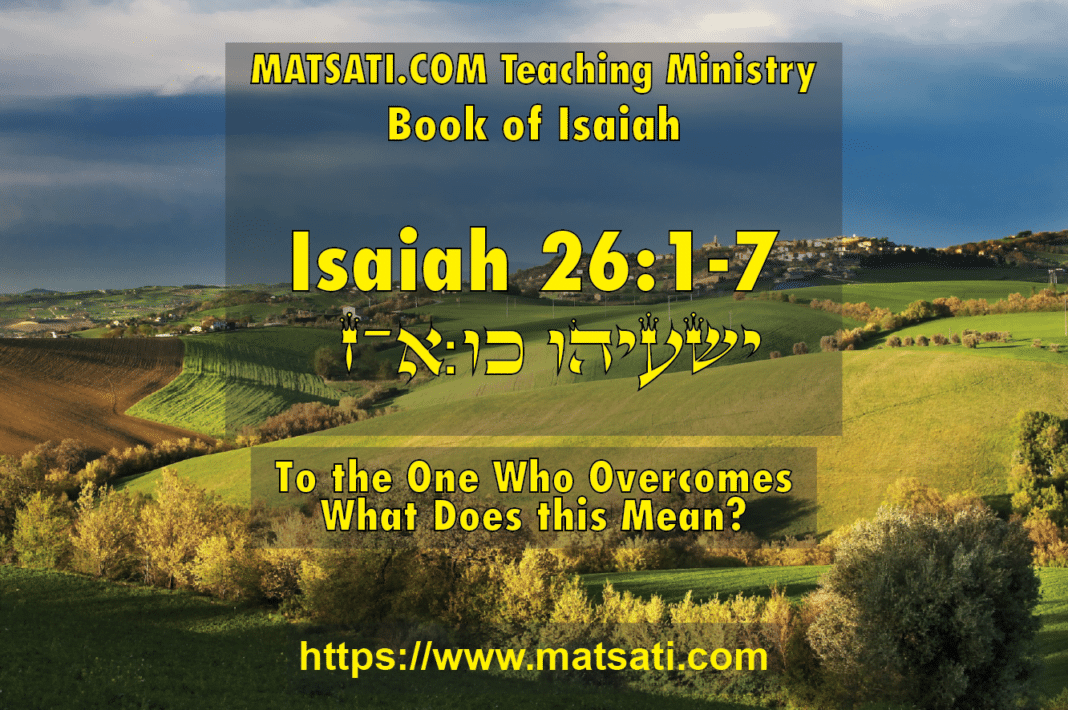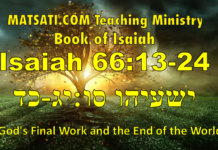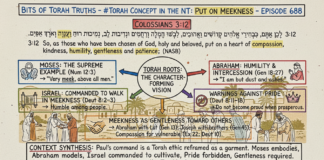Isaiah 26:1-7
Isaiah 26:1-21 and 27:1-13 continue along the same line of thought as we have been reading in Isaiah 24 and 25. The opening verse in Isaiah 26 refers to a song of joy (Isaiah 26:1, 26:19, 27:2). We note that in Isaiah 24-25, we read about the victory of God and the feast; here we see Isaiah 26-27 victory over the city of oppression (Isaiah 26:5, 27:10, 27:13). Generally speaking, the prophet Isaiah’s emphasis remains the same, the Lord God Almighty is Lord and King over all, he is sovereign and remains of central importance in the life of mankind here on earth. John Oswalt breaks down Isaiah 26-27 in the following way:
Classifying Isaiah 26-27
1. Isaiah 26:1-6: a song of thanksgiving in which Judah encourages herself to keep faith with God who has kept faith with her;
2. Isaiah 26:7-15: a reflection on the truth that the wicked can understand nothing except the rod of judgment upraised on behalf of God’s people;
3. Isaiah 26:16-19: a lament recognizing that God’s people are helpless in themselves;
4. Isaiah 26:20-27:1: the promise that God will indeed act;
5. Isaiah 27:2-12: God’s passion for his vineyard.
Scholars continue to debate over the idea that there was an Isaiah original, and this is a redacted copy. Due to their faith in this presupposition, the number of opinions concerning Isaiah 26:1-21 varies greatly. It is important to also note that many scholars base their interpretation upon this concept of an Isaianic original, and not upon what is preserved in the text today. We note that when we take the Isaiah text as it is in its present form, alongside the Torah, we realize the continuity in thought and truth that we have come to know thus far in Isaiah. Here Isaiah looks to a victorious future, and that one must have faith and strive for faithfulness in order to participate in these future events and the world to come. Isaiah speaks of the faithfulness of God to deliver His people and keep His holy Word. This is consistent with the Lord God fulfilling His promise to punish the sinful earth and that His people will be victorious over the earth for His name’s sake. Isaiah provides us with the assurance that these things will come to pass. We note how these things reveal to us how Isaiah being inspired by the Spirit of God, calls us to remain steadfast in our faith and trust in the Lord no matter what. This is such a fundamental truth, we even read of this in the book of Revelation according to Revelation 2:10-11.

Revelation 2:10-11
2:10 Fear none of those things which thou shalt suffer: behold, the devil shall cast some of you into prison, that ye may be tried; and ye shall have tribulation ten days: be thou faithful unto death, and I will give thee a crown of life. 2:11 He that hath an ear, let him hear what the Spirit saith unto the churches; He that overcometh shall not be hurt of the second death. (KJV, ܒ݁ܡܶܕܷ݁ܡ ܠܴܐ ܬܷ݁ܕ݂ܚܰܠ ܡܶܢ ܐܱܝܠܷܝܢ ܕܱ݁ܥܬ݂ܻܝܕ݂ ܐܱܢ̄ܬ݁ ܠܡܶܚܰܫ ܂ ܗܳܐ ܥܬ݂ܻܝܕ݂ ܐܴܟ݂ܶܠܩܰܪܨܴܐ ܕ݁ܢܰܪܡܶܐ ܡܶܢܟ݂ܽܘܢ ܒ݁ܒ݂ܶܝܬ݂ ܚܒ݂ܽܘܫܝܳܐ ܕ݁ܬ݂ܷܬ݂ܢܰܣܽܘܢ ܂ ܘܢܶܗܘܶܐ ܠܟ݂ܽܘܢ ܐܾܘܠܨܴܢܳܐ ܝܰܘܡܺܝ̈ܢ ܥܶܣܪܴܐ ܂ ܗܘܰܘ ܡܗܰܝ̈ܡܢܶܐ ܥܕ݂ܰܡܳܐ ܠܡܰܘܬܴ݁ܐ ܘܶܐܬܷ݁ܠ ܠܟ݂ܽܘܢ ܟ݁ܠܻܝܠܴܐ ܕ݁ܚܰܝܷ̈ܐ ܂ܕܻ݁ܐܝܬ݂ ܠܷܗ ܐܷܕ݂ܢܷ̈ܐ ܆ ܢܶܫܡܰܥ ܡܳܢܳܐ ܪܾܘܚܳܐ ܡܡܰܠܷܠ ܠܥܻ̈ܕ݂ܳܬ݂ܴܐ ܂ ܕܱ݁ܐܝܢܳܐ ܕ݁ܙܳܟ݂ܶܐ ܠܴܐ ܢܶܗܰܪ ܡܶܢ ܡܰܘܬܴ݁ܐ ܬܷ݁ܢܝܳܢܳܐ ܀ 10 ⸀μηδὲν φοβοῦ ἃ μέλλεις ⸁πάσχειν. ἰδοὺ ⸆ μέλλει ⸀1βάλλειν ὁ διάβολος ἐξ ὑμῶν εἰς φυλακὴν ἵνα πειρασθῆτε καὶ ⸀2ἕξετε θλῖψιν ⸀3ἡμερῶν δέκα.* γίνου πιστὸς ἄχρι θανάτου,* καὶ δώσω σοι τὸν στέφανον τῆς ζωῆς. 11 Ὁ ἔχων οὖς ἀκουσάτω τί τὸ πνεῦμα λέγει ταῖς ἐκκλησίαις. Ὁ νικῶν οὐ μὴ ἀδικηθῇ ἐκ τοῦ θανάτου τοῦ δευτέρου.*)
Here we are told how the Evil One will cast some in prison, hold false trials, and that we will go through tribulations, yet in the midst of all of this we are to remain faithful and in the end, will receive a crown of life. The major premise is given in Revelation 2:11, that the one who overcomes will not be hurt by the second death. Notice how the Revelation text moves from present, to future, to present, to future again. This is meant to build faith knowing what is going to happen, and when it does we are not surprised but more prepared to endure! Isaiah speaks in similar terms in regards to future-present-future to assure the reader or listener that hard times will come, there is no way out of this, but that we are to remain faithful. We note that taking all of these things together, we realize how the Lord God is all powerful, He loves us, and He remains steadfast with us too. We are told that He will bless those who are willing to submit their lives to him, and commit their lives to him!
We note that as we begin reading Isaiah 26:1-7, we realize that this song does not exhibit the typical features of what we find in biblical Hebrew poetic literature. The characteristic features of Hebrew poetry – parallelism, meter based on stress, repetitive patterns of structure, the use of chiasms and ballast variants, assonance, and occasionally paronomasia, nor the variety of repetitive patterns that may be found coupled with any archaic features. Even though this song does not follow the typical pattern, it nonetheless gives praise to God in heaven. While reading Isaiah 24-25 we see how the city of chaos overpowered and oppressed the people.
Isaiah 24:10
24:10 The city of confusion is broken down: Every house is shut up, that no man may come in. (KJV, נִשְׁבְּרָ֖ה קִרְיַת־תֹּ֑הוּ סֻגַּ֥ר כָּל־בַּ֖יִת מִבֹּֽוא׃)
Isaiah 25:2
25:2 For thou hast made of a city an heap; Of a defenced city a ruin: A palace of strangers to be no city; It shall never be built. (KJV, כִּ֣י שַׂ֤מְתָּ מֵעִיר֙ לַגָּ֔ל קִרְיָ֥ה בְצוּרָ֖ה לְמַפֵּלָ֑ה אַרְמֹ֤ון זָרִים֙ מֵעִ֔יר לְעֹולָ֖ם לֹ֥א יִבָּנֶֽה׃)
Isaiah 26:5
26:5 For he bringeth down them that dwell on high; The lofty city, he layeth it low; He layeth it low, even to the ground; He bringeth it even to the dust.(KJV, כִּ֤י הֵשַׁח֙ יֹשְׁבֵ֣י מָרֹ֔ום קִרְיָ֖ה נִשְׂגָּבָ֑ה יַשְׁפִּילֶ֤נָּה יַשְׁפִּילָהּ֙ עַד־אֶ֔רֶץ יַגִּיעֶ֖נָּה עַד־עָפָֽר׃)
These things speak to this city that was lofty, this suggests the people were filled with pride. Pride or arrogance leads to confusion (קִרְיַת־תֹּ֑הוּ), this is one of the reasons we should always flee those kinds of thoughts. These words of Isaiah reveal to us how the Lord God destroys what is false, and raises up what is holy, righteous, and true! The mention of Moab according to Isaiah 25:10-12 may suggest that this overthrow of Moab is the reason for the song. Again we note the people of Moab, their wickedness, sacrificing children to their gods (human sacrifice), the most awful of sins! We note the stark contrast by the Future expectation that is provided to us according to Isaiah 65:17-25 and Revelation 21:9-27. Here the Lord God will provide another city, one that is holy, righteous, built in truth, and whose walls are salvation, and whose gates only open to those who are humble and committed to serving the Lord God in heaven! The future expectation in both Isaiah and Revelation speak to the power of Isaiah’s words here that in order to be victorious in the future that one must have faith and strive for faithfulness in order to participate in these future events and have a part in the world to come. For example, Isaiah 65 states the following:
Isaiah 65:17-25
65:17 For, behold, I create new heavens and a new earth: And the former shall not be remembered, nor come into mind. 65:18 But be ye glad and rejoice for ever in that which I create: For, behold, I create Jerusalem a rejoicing, and her people a joy. 65:19 And I will rejoice in Jerusalem, and joy in my people: And the voice of weeping shall be no more heard in her, nor the voice of crying. 65:20 There shall be no more thence an infant of days, Nor an old man that hath not filled his days: For the child shall die an hundred years old; But the sinner being an hundred years old shall be accursed. 65:21 And they shall build houses, and inhabit them; And they shall plant vineyards, and eat the fruit of them. 65:22 They shall not build, and another inhabit; They shall not plant, and another eat: For as the days of a tree are the days of my people, And mine elect shall long enjoy the work of their hands. 65:23 They shall not labor in vain, Nor bring forth for trouble; For they are the seed of the blessed of the LORD, And their offspring with them. 65:24 And it shall come to pass, that before they call, I will answer; And while they are yet speaking, I will hear. 65:25 The wolf and the lamb shall feed together, And the lion shall eat straw like the bullock: And dust shall be the serpent’s meat. They shall not hurt nor destroy in all my holy mountain, saith the LORD. (KJV, כִּֽי־הִנְנִ֥י בֹורֵ֛א שָׁמַ֥יִם חֲדָשִׁ֖ים וָאָ֣רֶץ חֲדָשָׁ֑ה וְלֹ֤א תִזָּכַ֨רְנָה֙ הָרִ֣אשֹׁנֹ֔ות וְלֹ֥א תַעֲלֶ֖ינָה עַל־לֵֽב׃ כִּֽי־אִם־שִׂ֤ישׂוּ וְגִ֨ילוּ֙ עֲדֵי־עַ֔ד אֲשֶׁ֖ר אֲנִ֣י בֹורֵ֑א כִּי֩ הִנְנִ֨י בֹורֵ֧א אֶת־יְרוּשָׁלִַ֛ם גִּילָ֖ה וְעַמָּ֥הּ מָשֹֽׂושׂ׃ וְגַלְתִּ֥י בִירוּשָׁלִַ֖ם וְשַׂשְׂתִּ֣י בְעַמִּ֑י וְלֹֽא־יִשָּׁמַ֥ע בָּהּ֙ עֹ֔וד קֹ֥ול בְּכִ֖י וְקֹ֥ול זְעָקָֽה׃ לֹא־יִֽהְיֶ֨ה מִשָּׁ֜ם עֹ֗וד ע֤וּל יָמִים֙ וְזָקֵ֔ן אֲשֶׁ֥ר לֹֽא־יְמַלֵּ֖א אֶת־יָמָ֑יו כִּ֣י הַנַּ֗עַר בֶּן־מֵאָ֤ה שָׁנָה֙ יָמ֔וּת וְהַ֣חֹוטֶ֔א בֶּן־מֵאָ֥ה שָׁנָ֖ה יְקֻלָּֽל׃ וּבָנ֥וּ בָתִּ֖ים וְיָשָׁ֑בוּ וְנָטְע֣וּ כְרָמִ֔ים וְאָכְל֖וּ פִּרְיָֽם׃ לֹ֤א יִבְנוּ֙ וְאַחֵ֣ר יֵשֵׁ֔ב לֹ֥א יִטְּע֖וּ וְאַחֵ֣ר יֹאכֵ֑ל כִּֽי־כִימֵ֤י הָעֵץ֙ יְמֵ֣י עַמִּ֔י וּמַעֲשֵׂ֥ה יְדֵיהֶ֖ם יְבַלּ֥וּ בְחִירָֽי׃ לֹ֤א יִֽיגְעוּ֙ לָרִ֔יק וְלֹ֥א יֵלְד֖וּ לַבֶּהָלָ֑ה כִּ֣י זֶ֜רַע בְּרוּכֵ֤י יְהוָה֙ הֵ֔מָּה וְצֶאֱצָאֵיהֶ֖ם אִתָּֽם׃ וְהָיָ֥ה טֶֽרֶם־יִקְרָ֖אוּ וַאֲנִ֣י אֶעֱנֶ֑ה עֹ֛וד הֵ֥ם מְדַבְּרִ֖ים וַאֲנִ֥י אֶשְׁמָֽע׃ זְאֵ֨ב וְטָלֶ֜ה יִרְע֣וּ כְאֶחָ֗ד וְאַרְיֵה֙ כַּבָּקָ֣ר יֹֽאכַל־תֶּ֔בֶן וְנָחָ֖שׁ עָפָ֣ר לַחְמֹ֑ו לֹֽא־יָרֵ֧עוּ וְלֹֽא־יַשְׁחִ֛יתוּ בְּכָל־הַ֥ר קָדְשִׁ֖י אָמַ֥ר יְהוָֽה׃ ס)
Revelation 21:9-27
21:9 And there came unto me one of the seven angels which had the seven vials full of the seven last plagues, and talked with me, saying, Come hither, I will shew thee the bride, the Lamb’s wife. 21:10 And he carried me away in the spirit to a great and high mountain, and shewed me that great city, the holy Jerusalem, descending out of heaven from God, 21:11 Having the glory of God: and her light was like unto a stone most precious, even like a jasper stone, clear as crystal; 21:12 And had a wall great and high, and had twelve gates, and at the gates twelve angels, and names written thereon, which are the names of the twelve tribes of the children of Israel: 21:13 On the east three gates; on the north three gates; on the south three gates; and on the west three gates. 21:14 And the wall of the city had twelve foundations, and in them the names of the twelve apostles of the Lamb. 21:15 And he that talked with me had a golden reed to measure the city, and the gates thereof, and the wall thereof. 21:16 And the city lieth foursquare, and the length is as large as the breadth: and he measured the city with the reed, twelve thousand furlongs. The length and the breadth and the height of it are equal. 21:17 And he measured the wall thereof, an hundred and forty and four cubits, according to the measure of a man, that is, of the angel. 21:18 And the building of the wall of it was of jasper: and the city was pure gold, like unto clear glass. 21:19 And the foundations of the wall of the city were garnished with all manner of precious stones. The first foundation was jasper; the second, sapphire; the third, a chalcedony; the fourth, an emerald; 21:20 The fifth, sardonyx; the sixth, sardius; the seventh, chrysolite; the eighth, beryl; the ninth, a topaz; the tenth, a chrysoprasus; the eleventh, a jacinth; the twelfth, an amethyst. 21:21 And the twelve gates were twelve pearls; every several gate was of one pearl: and the street of the city was pure gold, as it were transparent glass. 21:22 And I saw no temple therein: for the Lord God Almighty and the Lamb are the temple of it. 21:23 And the city had no need of the sun, neither of the moon, to shine in it: for the glory of God did lighten it, and the Lamb is the light thereof. 21:24 And the nations of them which are saved shall walk in the light of it: and the kings of the earth do bring their glory and honor into it. 21:25 And the gates of it shall not be shut at all by day: for there shall be no night there. 21:26 And they shall bring the glory and honor of the nations into it. 21:27 And there shall in no wise enter into it any thing that defileth, neither whatsoever worketh abomination, or maketh a lie: but they which are written in the Lamb’s book of life. (KJV)
The interesting thing is what we read according to Isaiah 65:17-25, that the Lord God Almighty is going to create a new heaven and a new earth! What exactly does this imply? What this implies is that of the removal of sin which led to the curse of the land and the difficulties in life, i.e. being thrown in prison, holding false trials, and that of going through tribulations. In Revelation we are told of the city that God Himself makes for a dwelling place for His presence and for all of mankind, those who are faithful and true. The description of the foundations of this city provides the imagery of the incomprehensible value of such a place. This city is established on the Torah, referencing 12 foundations for the 12 tribes of Israel. The streets are made of pure gold and the twelve gates are as pearls, and we are told that 21:25 And the gates of it shall not be shut at all by day: for there shall be no night there. 21:26 And they shall bring the glory and honor of the nations into it. 21:27 And there shall in no wise enter into it any thing that defileth, neither whatsoever worketh abomination, or maketh a lie: but they which are written in the Lamb’s book of life. (KJV) Note the significance of these things. This book of life is mentioned in the Torah according to Parashat Ki Tisa (Exodus 30:11-34:35) with Moshe speaking to God concerning Israel’s sin and being blotted out of the book. This is the book Moshe was referring to. Note also the connection to the Lamb of God, Yeshua the Messiah! This also illustrates the significance of our faith in the Messiah Yeshua in order to partake in all of these things! Truely, all of Scripture intimately works together to provide us with this great hope, that we are loved by God, that He is always with us, and that we have a wonderful and powerful redeemer, Yeshua, in whom we have the forgiveness of sins! Truly, all glory and honor belong to the Lord!
Isaiah opens with a song about the salvation of God according to Isaiah 26:1:
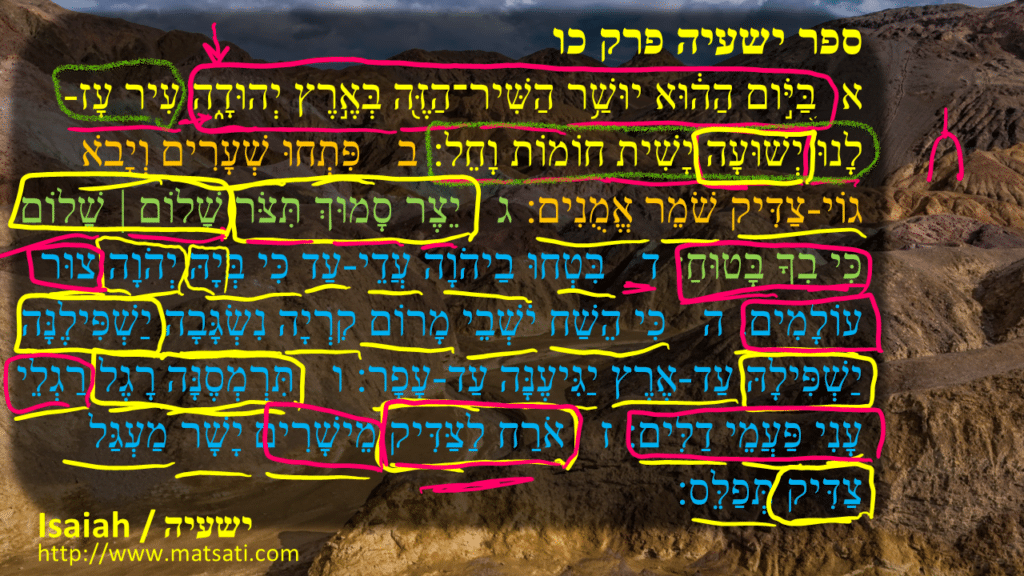
ספר ישעיה פרק כו
א בַּיּוֹם הַהוּא יוּשַׁר הַשִּׁיר-הַזֶּה בְּאֶרֶץ יְהוּדָה עִיר עָז-לָנוּ יְשׁוּעָה יָשִׁית חוֹמוֹת וָחֵל:
Isaiah 26:1 states, “In that day shall this song be sung in the land of Judah; We have a strong city; salvation will God appoint for walls and bulwarks. (בַּיּוֹם הַהוּא יוּשַׁר הַשִּׁיר-הַזֶּה בְּאֶרֶץ יְהוּדָה עִיר עָז-לָנוּ יְשׁוּעָה יָשִׁית חוֹמוֹת וָחֵל)” The first half of the verse states בַּיֹּ֣ום הַה֔וּא יוּשַׁ֥ר הַשִּׁיר־הַזֶּ֖ה בְּאֶ֣רֶץ יְהוּדָ֑ה, the etnach cantillation mark marks the division in the verse at Judah (יְהוּדָ֑ה). We note how Isaiah is turning the focus back upon eretz Yisrael. Isaiah says in second half of the verse עִיר עָז-לָנוּ יְשׁוּעָה יָשִׁית חוֹמוֹת וָחֵל “we have a strong city, salvation walls and outer wall / rampart.” Here it appears that we are being told how salvation Yeshua (יְשׁוּעָה) will be for a wall and rampart (outer wall) to us. These walls are called the walls of salvation. The one thing that the salvation of God does is that it protects us. When we repent, turn from our wicked ways, and decide to live our lives for the Lord according to His holy word by faith, these walls of salvation are erected and set up around us. These walls provide a place for growing spiritually, and for having a life in the kingdom. This then leads to protection from the sins that destroy the body, relationships, and greed that so plague this nation and the world. The only true defense comes from the Lord God Almighty in heaven, and Yeshua provides us with a means for how we should live, what it means to have a life in the kingdom of Heaven, according to Matthew 5:2-12.
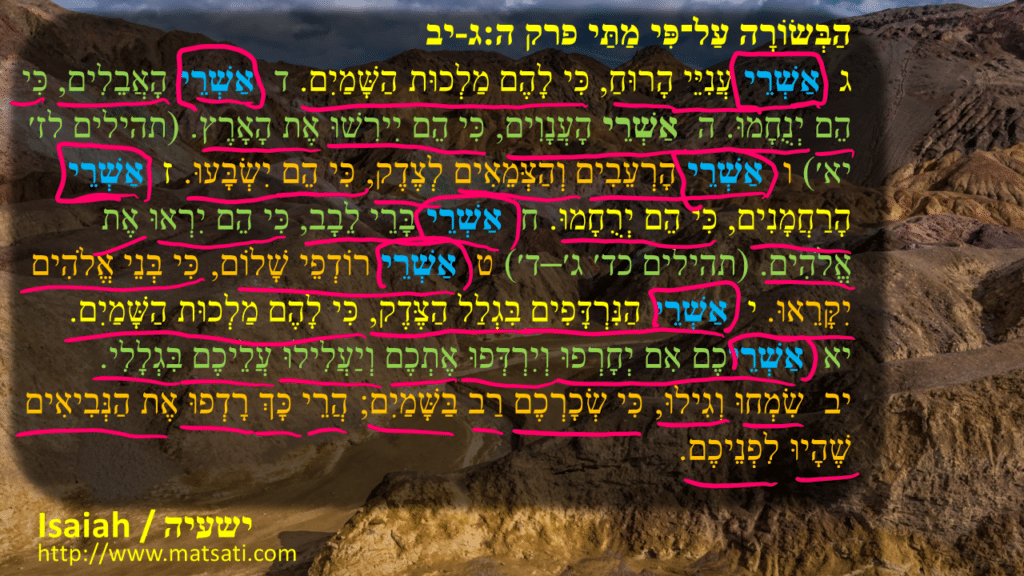
הַבְּשׂוֹרָה עַל־פִּי מַתַּי פרק ה:ג-יב
ג אַשְׁרֵי עֲנִיֵּי הָרוּחַ, כִּי לָהֶם מַלְכוּת הַשָּׁמַיִם. ד אַשְׁרֵי הָאֲבֵלִים, כִּי הֵם יְנֻחָמוּ. ה אַשְׁרֵי הָעֲנָוִים, כִּי הֵם יִירְשׁוּ אֶת הָאָרֶץ. (תהילים לז׳ יא׳) ו אַשְׁרֵי הָרְעֵבִים וְהַצְּמֵאִים לְצֶדֶק, כִּי הֵם יִשְׂבָּעוּ. ז אַשְׁרֵי הָרַחֲמָנִים, כִּי הֵם יְרֻחָמוּ. ח אַשְׁרֵי בָּרֵי לֵבָב, כִּי הֵם יִרְאוּ אֶת אֱלֹהִים. (תהילים כד׳ ג׳–ד׳) ט אַשְׁרֵי רוֹדְפֵי שָׁלוֹם, כִּי בְּנֵי אֱלֹהִים יִקָּרֵאוּ. י אַשְׁרֵי הַנִּרְדָּפִים בִּגְלַל הַצֶּדֶק, כִּי לָהֶם מַלְכוּת הַשָּׁמַיִם. יא אַשְׁרֵיכֶם אִם יְחָרְפוּ וְיִרְדְּפוּ אֶתְכֶם וְיַעֲלִילוּ עֲלֵיכֶם בִּגְלָלִי. יב שִׂמְחוּ וְגִילוּ, כִּי שְׂכָרְכֶם רַב בַּשָּׁמַיִם; הֲרֵי כָּךְ רָדְפוּ אֶת הַנְּבִיאִים שֶׁהָיוּ לִפְנֵיכֶם.
We note what Yeshua is saying here, how the kingdom of Heaven is present right now, in each of our lives. This parallels the idea that Isaiah is providing us here in Isaiah 26:1. These blessings represent what God gives His people in the salvation that protects us. Yeshua reveals the lifestyle of those who are truly faithful and believe in the Word of God. Something to notice here is that Yeshua does not use the word ברוך (baruch) but instead uses the word אשרי (ashrei) to describe the blessedness of these things. Our English translations do their translation a slight disservice, translating this as “blessed are…” We should note there is no “are” and “is” in the Hebrew language. The word אשרי is more properly translated as “O the blessedness of the…” which is a way to express strong emotion (a particle injection in the text) which means “how happy is the…” So, the difference here from the Hebrew translation, and what the English translation falls short with, is that Yeshua was not speaking of a future event, but a present-day reality of the joy of those who live like this, who are a part of the kingdom of Heaven, and who walk in God’s holy and righteous ways! Using this analysis, the Beatitudes may be read in the following way:
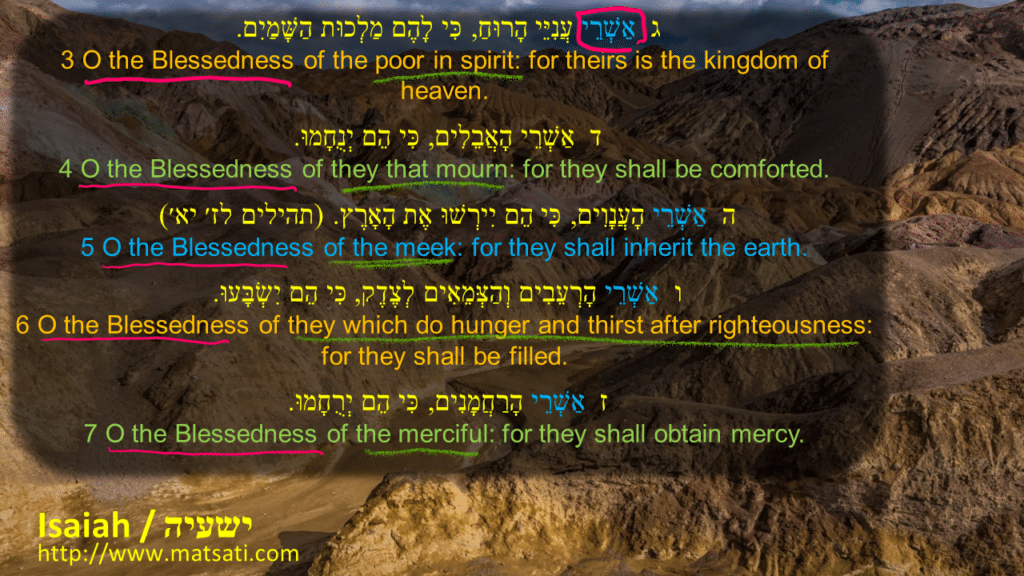
ג אַשְׁרֵי עֲנִיֵּי הָרוּחַ, כִּי לָהֶם מַלְכוּת הַשָּׁמַיִם.
3 O the Blessedness of the poor in spirit: for theirs is the kingdom of heaven.
ד אַשְׁרֵי הָאֲבֵלִים, כִּי הֵם יְנֻחָמוּ.
4 O the Blessedness of they that mourn: for they shall be comforted.
ה אַשְׁרֵי הָעֲנָוִים, כִּי הֵם יִירְשׁוּ אֶת הָאָרֶץ. (תהילים לז׳ יא׳)
5 O the Blessedness of the meek: for they shall inherit the earth.
ו אַשְׁרֵי הָרְעֵבִים וְהַצְּמֵאִים לְצֶדֶק, כִּי הֵם יִשְׂבָּעוּ.
6 O the Blessedness of they which do hunger and thirst after righteousness: for they shall be filled.
ז אַשְׁרֵי הָרַחֲמָנִים, כִּי הֵם יְרֻחָמוּ.
7 O the Blessedness of the merciful: for they shall obtain mercy.
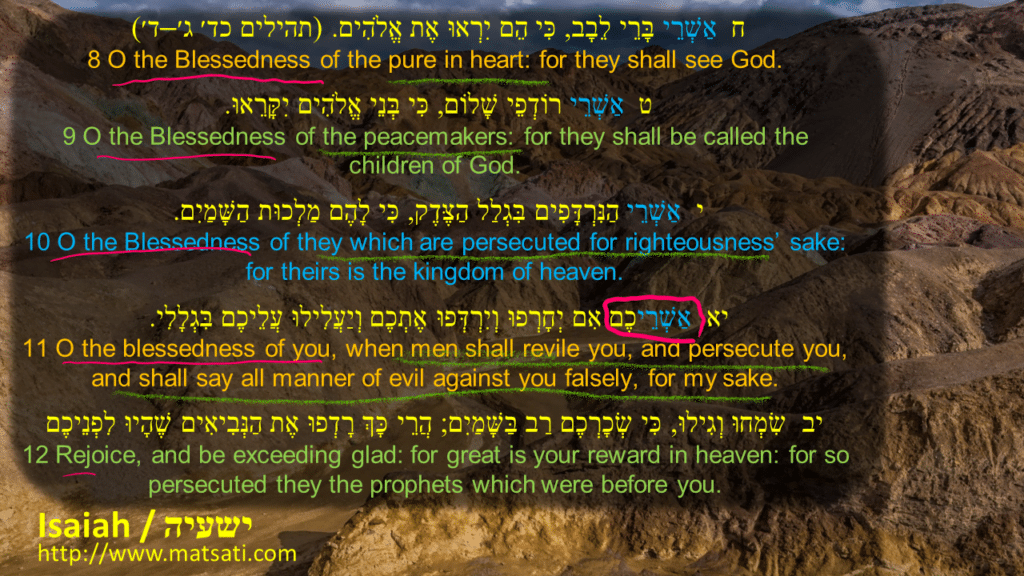
ח אַשְׁרֵי בָּרֵי לֵבָב, כִּי הֵם יִרְאוּ אֶת אֱלֹהִים. (תהילים כד׳ ג׳–ד׳)
8 O the Blessedness of the pure in heart: for they shall see God.
ט אַשְׁרֵי רוֹדְפֵי שָׁלוֹם, כִּי בְּנֵי אֱלֹהִים יִקָּרֵאוּ.
9 O the Blessedness of the peacemakers: for they shall be called the children of God.
י אַשְׁרֵי הַנִּרְדָּפִים בִּגְלַל הַצֶּדֶק, כִּי לָהֶם מַלְכוּת הַשָּׁמַיִם.
10 O the Blessedness of they which are persecuted for righteousness’ sake: for theirs is the kingdom of heaven.
יא אַשְׁרֵיכֶם אִם יְחָרְפוּ וְיִרְדְּפוּ אֶתְכֶם וְיַעֲלִילוּ עֲלֵיכֶם בִּגְלָלִי.
11 O the blessedness of you, when men shall revile you, and persecute you, and shall say all manner of evil against you falsely, for my sake.
יב שִׂמְחוּ וְגִילוּ, כִּי שְׂכָרְכֶם רַב בַּשָּׁמַיִם; הֲרֵי כָּךְ רָדְפוּ אֶת הַנְּבִיאִים שֶׁהָיוּ לִפְנֵיכֶם
12 Rejoice, and be exceeding glad: for great is your reward in heaven: for so persecuted they the prophets which were before you.
We note how these things demonstrate the present reality for those who are the children of God. We note the order of the concepts that are laid down here, Yeshua opens in Matthew 5:3-5 with being עֲנִיֵּי הָרוּחַ “poor in spirit,” הָאֲבֵלִים “the mourners,” and הָעֲנָוִים “the humble” these three verses speak to the humble of heart. Being humble before God and men is of the highest priority according to Isaiah and Yeshua. Yeshua says that these who are humble are like הָרְעֵבִים וְהַצְּמֵאִים לְצֶדֶק “those who hunger and thirst for righteousness.” Yeshua says in Matthew 5:6-11, הָרַחֲמָנִים “the merciful,” בָּרֵי לֵבָב “the pure in heart,” רוֹדְפֵי שָׁלוֹם “those who pursue peace,” הַנִּרְדָּפִים בִּגְלַל הַצֶּדֶק “those who are pursued/persecuted for righteousness,” אִם יְחָרְפוּ וְיִרְדְּפוּ אֶתְכֶם “and those who men revile and persecute.” Note how these things follow from the previous characteristics of those who are faithful, where humility is the keynote of the beatitudes. This Isaianic phrase עִיר עָז-לָנוּ יְשׁוּעָה יָשִׁית חוֹמוֹת וָחֵל that speaks of the strong city, the walls, and the outer wall, speaks to these things being a wall of protection for those who love the Lord and Yeshua the Messiah! We note the central point of the verse is the יְשׁוּעָה Yeshua / Salvation of God. Here Yeshua is the focus point, the keyword that speaks to the need to have faith in the salvation of God and the way in which He has provided that Salvation (Yeshua). We note how Isaiah is using a physical wall to illustrate the spiritual walls that only God can provide. In the humbleness of heart, Yeshua said “You know that those who are considered rulers of the Gentiles lord it over them, and their great one’s exercise authority over them. But it shall not be so among you. But whoever would be great must be your servant, and whoever would be first among you must be slave of all. For the son of Man came not to be served but to serve, and to give his life as a ransom for many.” (Mark 10:42-45) Notice how the keyword here is being a servant, where the underlying principle is to be humble! This is how the redeemed community of believers are to live and practice their faith! These are the underlying principles that constitute what Isaiah is saying here according to Isaiah 26:1. The salvation of God, this involves Yeshua, who is the true King and Source of this kingdom of Heaven that we presently have in our faith and lives today! This is why Isaiah said what he did in opening chapter 26, and this is also why Yeshua said what he did according to Luke 9:10 saying, “The Son of Man came to seek and to save the lost.” We also note the opposite of being poor in spirit (עֲנִיֵּי הָרוּחַ) is to be prideful. Pride is the topic Isaiah has been speaking about from the very beginning of his book! Pride has no place with righteousness and faithfulness!
Isaiah continues saying the following according to Isaiah 26:2.
ספר ישעיה פרק כו
ב פִּתְחוּ שְׁעָרִים וְיָבֹא גוֹי-צַדִּיק שֹׁמֵר אֱמֻנִים:
Isaiah 26:2 states, “Open ye the gates, that the righteous nation which keepeth the truth may enter in. (פִּתְחוּ שְׁעָרִים וְיָבֹא גוֹי-צַדִּיק שֹׁמֵר אֱמֻנִים)” We note the many parallels to this especially from the book of Revelation. The gates are reminiscent of the Psalms also according to Tehillim / Psalms 15:1-5, 24:3-10, and 119:19-20. We note that morality is the central theme in the concept of the righteousness of the nation which keeps truth, the truth of God. (Isaiah 1:26, 32:16-17, 33:13-16, Hosea 2:18-20, 6:6, Amos 5:21-24) The Torah writes the following concerning righteousness:
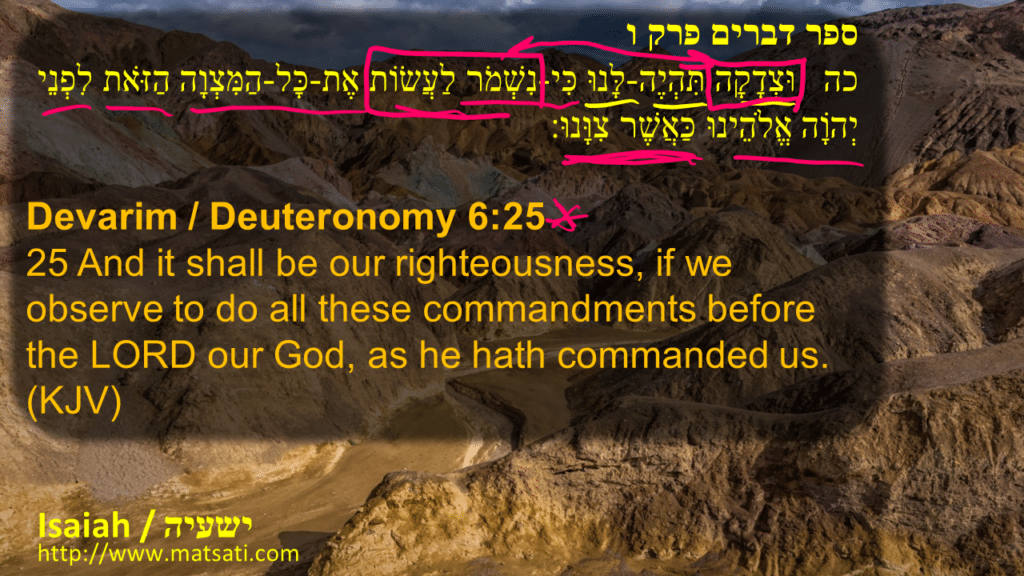
ספר דברים פרק ו
כה וּצְדָקָה תִּהְיֶה-לָּנוּ כִּי-נִשְׁמֹר לַעֲשֹוֹת אֶת-כָּל-הַמִּצְוָה הַזֹּאת לִפְנֵי יְהוָֹה אֱלֹהֵינוּ כַּאֲשֶׁר צִוָּנוּ:
Devarim / Deuteronomy 6:25
25 And it shall be our righteousness, if we observe to do all these commandments before the LORD our God, as he hath commanded us. (KJV)
Notice how the Torah describes this saying, וּצְדָקָה תִּהְיֶה-לָּנוּ כִּי-נִשְׁמֹר לַעֲשֹוֹת אֶת-כָּל-הַמִּצְוָה הַזֹּאת that righteousness is a function of obeying God’s holy word! We also note in both the biblical and rabbinic literature, that morality is paralleled to idolatry, since one who follows after other gods has an adulterous spirit against the God in heaven! This is part of the “ethical righteousness” that is spoken of this isn’t simply about sexual morality, but spiritual as well! Note how these things tie back into our Isaiah text and to Yeshua’s words according to Revelation 21:6.
Revelation 21:6
21:6 And he said unto me, It is done. I am Alpha and Omega, the beginning and the end. I will give unto him that is athirst of the fountain of the water of life freely. (KJV, ܘܶܐܡܰܪ ܠܻܝ ܗܘܰܝ̈ ܂ ܐܷܢܳܐ ܐܴܠܱܦ݂ ܘܶܐܢܳܐ ܬܱ݁ܘ ܂ ܪܻܝܫܺܝܬ݂ܴܐ ܘܫܽܘܠܴܡܳܐ ܂ ܠܕ݂ܰܨܗܶܐ ܐ̱ܢܳܐ ܐܷܬܷ݁ܠ ܡܶܢ ܥܰܝܢܳܐ ܕ݁ܡܰܝܴ̈ܐ ܚܰܝܷ̈ܐ ܡܰܓܴ݁ܢ ܂ 6 καὶ ⸀εἶπέν μοι· ⸂γέγοναν.* ἐγώ [εἰμι]⸃ τὸ ἄλφα καὶ τὸ ὦ, ⸆ ἡ ἀρχὴ καὶ τὸ τέλος. ἐγὼ τῷ διψῶντι δώσω ⸇ ἐκ ⸋τῆς πηγῆς⸌ τοῦ ὕδατος τῆς ζωῆς δωρεάν.*)
We see how those who thirst for righteousness, those who thirst for the kingdom, those who thirst for the salvation of God, those who thirst for God’s holy Word in their lives, Yeshua speaks to giving to such persons who do this freely from the water of life! We note that this is not a formulaic methodology to salvation. These things come by the presence of God dwelling in our midst, inside of us, this Torah centric principle of the power of God making His residence in us who believe! The presence of God in our lives leads to our desire to serve Him, to be humble, to bring glory to the name of the Lord by bearing His testimonies according to His holy Word! We not how pro-Torah Isaiah is, Yeshua is, and Revelation is, etc! If we go through the NT text verse by verse, it is quite easy to see how Torah-centric all of the NT is in these very things we have been discussing thus far! We note that the righteousness that is received through obeying the commands, this is a function of God living and working in and through His people. The truth of these things is that to what Yeshua said again in Matthew 5, humility, that the only genuinely “righteous” person is the one who admits that no good thing dwells in him, just like Paul wrote in Romans 7:18, but trusts God’s promise of deliverance and cleansing. This trust and the thirst for Godliness and to as our rabbi Yeshua, in his likeness, these are the things that truly flow from those that trust in the Lord, and it is here that true righteousness is found! (Philippians 3:12–16).
Isaiah continues saying the following according to Isaiah 26:3.
ספר ישעיה פרק כו
ג יֵצֶר סָמוּךְ תִּצֹּר שָׁלוֹם | שָׁלוֹם כִּי בְךָ בָּטוּחַ:
Isaiah 26:3 states, “Thou wilt keep him in perfect peace, whose mind is stayed on thee: because he trusts in thee. (יֵצֶר סָמוּךְ תִּצֹּר שָׁלוֹם | שָׁלוֹם כִּי בְךָ בָּטוּחַ)” Isaiah speaks to this salvation that only God can provide, that brings שָׁלוֹם שָׁלוֹם “perfect peace.” Isaiah says יֵ֣צֶר סָמ֔וּךְ תִּצֹּ֖ר “the purpose of support and watching” this describes the one who fixes his attention upon the Lord meaning that he does not have two masters (Matthew 6:24) and he is not torn between two ways of thought (James 1:6-8) as are those who hold to the woke ideologies of LGBTQ and pretend to be believers in the Word of God. We note how consistent with what Paul says that God will give us a peace that surpasses all understanding. (Philippians 4:7) In fact, the whole of Torah was given for the sake of peace, and it is said, “all her paths are peace” (Mishley / Proverbs. 3:17).This reminds us of the Jewish prayer for peace תפילה לשלום.
תפילה לשלום
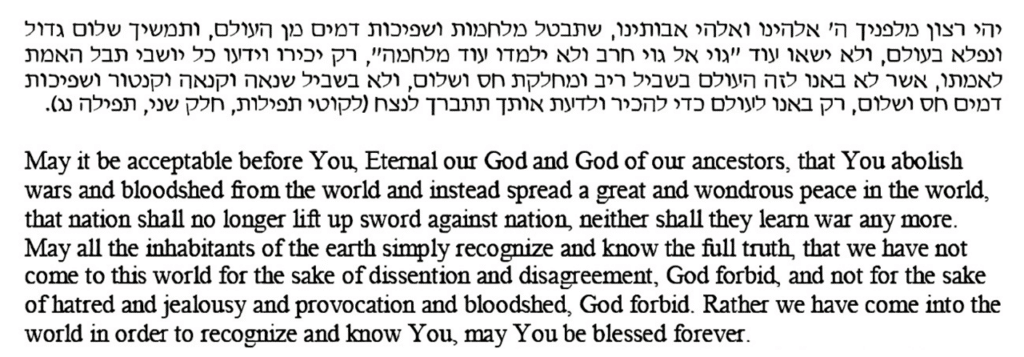
This is the kind of peace that the truly faithful want for this world, of God’s miraculous intervention to bring peace. Note again how this prayer is consistent with what we are studying here from the book of Isaiah, from Matthew 5, and the book of Revelation! We can see the practical advantage to trusting in the Lord as opposed to trusting in ourselves. This peace that God gives that surpasses all understanding, when we have this deep relationship with God and His Messiah Yeshua, we are able to see hope and are able to be confident in our outlook towards life regardless of how dark our situation may be. This peace helps us to look forward to the immortality that God will give to those who remain faithful to Him, trusting in Him for that help to obey His holy Word, and seeking the indwelling presence to help overcome sin, to increase our faith, and to live to bring glory to the Lord God Almighty our Father in heaven!
Isaiah goes on saying the following according to Isaiah 26:4-6.
ספר ישעיה פרק כו
ד בִּטְחוּ בַיהֹוָה עֲדֵי-עַד כִּי בְּיָהּ יְהֹוָה צוּר עוֹלָמִים: ה כִּי הֵשַׁח יֹשְׁבֵי מָרוֹם קִרְיָה נִשְֹגָּבָה יַשְׁפִּילֶנָּה יַשְׁפִּילָהּ עַד-אֶרֶץ יַגִּיעֶנָּה עַד-עָפָר: ו תִּרְמְסֶנָּה רָגֶל רַגְלֵי עָנִי פַּעֲמֵי דַלִּים:
Isaiah 26:4 states, “Trust ye in the LORD for ever: for in the LORD JEHOVAH is everlasting strength: (בִּטְחוּ בַיהֹוָה עֲדֵי-עַד כִּי בְּיָהּ יְהֹוָה צוּר עוֹלָמִים)” Isaiah 26:5 “For he bringeth down them that dwell on high; the lofty city, he layeth it low; he layeth it low, even to the ground; he bringeth it even to the dust. (כִּי הֵשַׁח יֹשְׁבֵי מָרוֹם קִרְיָה נִשְֹגָּבָה יַשְׁפִּילֶנָּה יַשְׁפִּילָהּ עַד-אֶרֶץ יַגִּיעֶנָּה עַד-עָפָר)” Isaiah 26:6 “The foot shall tread it down, even the feet of the poor, and the steps of the needy. (תִּרְמְסֶנָּה רָגֶל רַגְלֵי עָנִי פַּעֲמֵי דַלִּים)” We note that this appears to be the first time that the YHVH name of God is attempted to be transliterated as “Jehovah” in the KJV English translation of Isaiah. This verse translates from the Hebrew Bible (MSS) saying, בִּטְחוּ בַיהֹוָה עֲדֵי-עַד כִּי בְּיָהּ יְהֹוָה צוּר עוֹלָמִים “trust in the Lord, until perpetuity, because the Lord HaShem is an everlasting rock.” It appears the reason the KJV chose to attempt to transliterate the YHVH was because the circumlocution יה (Yah) was written juxtaposed to the YHVH. The significance of this point is that throughout the Hebrew bible, the YHVH (the Name of God) is written with nikkud vowel marks to indicate how it was to be written when spoken. The vowel marks are meant to be a visual queue for this purpose. And it is because of this tradition that the actual way to pronounce the name of God has been lost. The more accurate way to describe this is that the reason for this is so that God’s people would not make God’s name common and so giving the nations or anyone the opportunity to blaspheme the name of God. We note that by the time of the Talmud, it was the custom to use substitute Names for God while reading or speaking out loud. Some rabbis asserted that a person who pronounces YHVH according to its letters (instead of using a substitute) has no place in the World to Come and should be put to death. This is the tradition that was passed down and is generally followed when we see the “YHVH Elohim” written the English translation says “Lord God” instead of pronouncing the four-letter Name. It is also Jewish tradition to substitute the Name “Adonai,” or simply say “HaShem” which literally means “The Name.” Now this idea of protecting the name of God is an ancient practice, so ancient in fact, there is an interesting observation that we can make according to the book of Job. Before we look at the text, the first question is when was the book of Job written? How do we know when to place the book of Job when we do not know who actually wrote that book or when Job lived? There are 10 reasons why it is believed the narrative in the book of Job occurred around the time of the Patriarchs. (i) Job lived 140 years after his calamities (see Job 42:16). We note that this is a very long lifespan, and it corresponds to a period of time that was near the flood event when God had limited the life of man to 120 years, the generations that come from the sons of Noah we can see in the biblical narrative were shortening to synchronize with what God had said according to the Torah. (Bereshit / Genesis 6:3) (ii) We also note that Job’s wealth was accounted for based upon the number of livestock (see Job 1:3 and 42:12). This was also true of Abraham (see Bereshit / Genesis 12:16) and Jacob (Bereshit / Genesis 30:43). (iii) The Sabeans and Chaldeans (Job 1:15, 1:17) were nomads in Abraham’s time, but in later years were not. (iv) The Hebrew word קְשִׂיטָ֣ה translated “measure of weight of a coin” (Job 42:11) is used elsewhere only twice (Bereshit / Genesis 33:19 and Joshua 24:32). Both times are in reference to Jacob. (iv) Job’s daughters were heirs of his estate along with their brothers (see Job 42:15). This was not common, and we note this based upon Bamidbar / Numbers 27:8 and the daughters of zelophehad, and Moshe giving a ruling that daughters can be heirs of estate too, which was not common prior to this even in the Torah. (vi) We also know that literary works similar in some ways to the book of Job were written in Egypt and Mesopotamia around the time of the patriarchs. (vii) The Book of Job includes no references to the priesthood, the Torah, tabernacle, special religious days and feasts, etc placing this pre-Moshe (pre-Torah period). (viii) The name El Shaddai was used while speaking about God 31 times in Job as compared with 17 times elsewhere in the Tanakh, note this was a name that was familiar to the patriarchs. (ix) Several personal names and place / location names are used in Job which were also associated with the patriarchal time period. Examples include Sheba a grandson of Abraham, Tema another grandson of Abraham, Eliphaz a son of Esau, and Uz a nephew of Abraham. (x) Job was a common West Semitic name in the second millennium B.C. Job was also a name of a 19th-century-B.C. prince in the Egyptian Execration texts. (Clines, David J.A. Word Biblical Commentary. Dallas, TX: Word Publishing. 1969. Vol. 17, Job 1-20. pp. 10-11.) Based upon this analysis of Job, we can pretty confidently get the approximal timeframe as being at the time of the patriarchs.
As we had mentioned earlier, this idea of protecting the name of God is an ancient practice, so ancient in fact, there is an interesting observation that we can make according to the book of Job that may be found in Job 2:9 and
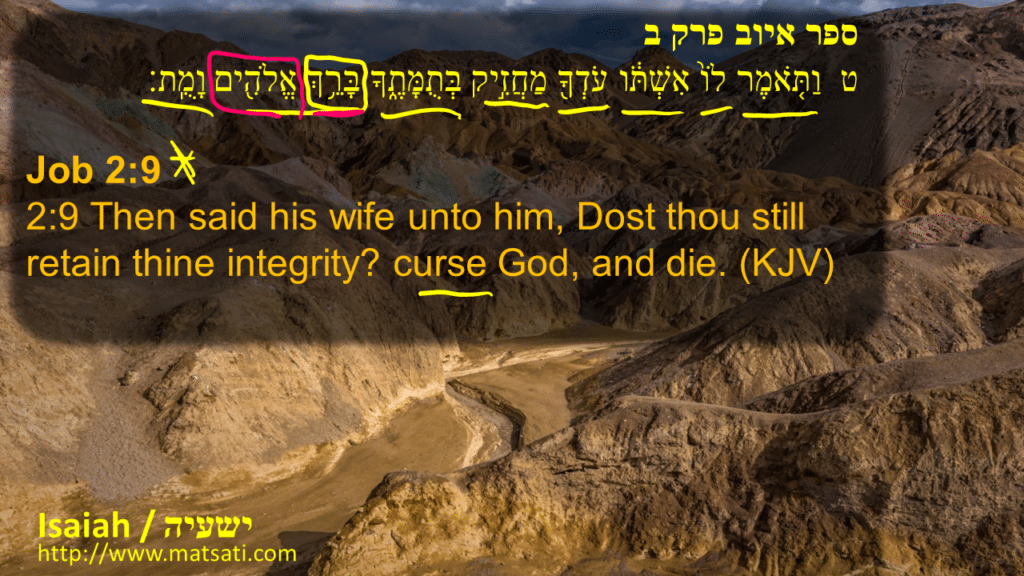
ספר איוב פרק ב
ט וַתֹּ֤אמֶר לֹו֙ אִשְׁתֹּ֔ו עֹדְךָ֖ מַחֲזִ֣יק בְּתֻמָּתֶ֑ךָ בָּרֵ֥ךְ אֱלֹהִ֖ים וָמֻֽת׃
Job 2:9
2:9 Then said his wife unto him, Dost thou still retain thine integrity? curse God, and die. (KJV)
Note here the way the text is written, וַתֹּ֤אמֶר לֹו֙ אִשְׁתֹּ֔ו “and his wife said to him,” עֹדְךָ֖ מַחֲזִ֣יק בְּתֻמָּתֶ֑ךָ “still you maintain/make strong your integrity,” בָּרֵ֥ךְ אֱלֹהִ֖ים וָמֻֽת “curse God and die.” Now looking at this verse, where the text states “curse God and die” the word for curse is בָּרֵ֥ךְ which actually means “bless.” What this demonstrates for us is that of protecting of the name of God, the author did not want to place the word “cruse” next to the name of God or here in this case next to אֱלֹהִ֖ים (Elohim). What this illustrates for us is how important it is to protect the Name of God and not attempt to pronounce the name. Most importantly because we do not know how this name was actually pronounced because of the Jewish tradition that surrounds this idea. In addition, by mispronouncing the name, one could possibly be calling upon the name of another god, as opposed to the one whom the Scriptures describe.
The point of Isaiah 26:4 which states, בִּטְחוּ בַיהֹוָה עֲדֵי-עַד כִּי בְּיָהּ יְהֹוָה צוּר עוֹלָמִים “Trust ye in the Lord for ever: for in the Lord HaShem is everlasting Rock” is that He is eternal and unmoving! Isaiah is providing us with the reason to trust in HaShem, and this is because He is a solid foundation for our feet! We note again the city walls, we do not trust in these, but in the kingdom of God that is promised to those who believe, and trust in Yeshua God’s holy and righteous Mashiakh! The point is that it is worthwhile to wait upon the Lord for Him to move and perform powerful works in our midst! This is how the Torah describes these things when Moshe reiterated the significance of what God had done for the people!
ספר דברים פרק ד
לד אוֹ | הֲנִסָּה אֱלֹהִים לָבוֹא לָקַחַת לוֹ גוֹי מִקֶּרֶב גּוֹי בְּמַסֹּת בְּאֹתֹת וּבְמוֹפְתִים וּבְמִלְחָמָה וּבְיָד חֲזָקָה וּבִזְרוֹעַ נְטוּיָה וּבְמוֹרָאִים גְּדֹלִים כְּכֹל אֲשֶׁר-עָשָֹה לָכֶם יְהוָֹה אֱלֹהֵיכֶם בְּמִצְרַיִם לְעֵינֶיךָ: לה אַתָּה הָרְאֵתָ לָדַעַת כִּי יְהוָֹה הוּא הָאֱלֹהִים אֵין עוֹד מִלְּבַדּוֹ: לו מִן-הַשָּׁמַיִם הִשְׁמִיעֲךָ אֶת-קֹלוֹ לְיַסְּרֶךָּ וְעַל-הָאָרֶץ הֶרְאֲךָ אֶת-אִשּׁוֹ הַגְּדוֹלָה וּדְבָרָיו שָׁמַעְתָּ מִתּוֹךְ הָאֵשׁ:
Devarim / Deuteronomy 4:34-35
4:34 Or hath God assayed to go and take him a nation from the midst of another nation, by temptations, by signs, and by wonders, and by war, and by a mighty hand, and by a stretched out arm, and by great terrors, according to all that the LORD your God did for you in Egypt before your eyes? 4:35 Unto thee it was shewed, that thou mightest know that the LORD he is God; there is none else beside him. 4:36 Out of heaven he made thee to hear his voice, that he might instruct thee: and upon earth he shewed thee his great fire; and thou heardest his words out of the midst of the fire.
Moshe calls upon the miracles that God performed throughout their deliverance from slavery and brought before the mountain of Sinai. The remembrance of these things is meant to humble the people and to recognize who God is! This is how Isaiah writes saying Isaiah 26:5 “For he bringeth down them that dwell on high; the lofty city, he layeth it low; he layeth it low, even to the ground; he bringeth it even to the dust. (כִּי הֵשַׁח יֹשְׁבֵי מָרוֹם קִרְיָה נִשְֹגָּבָה יַשְׁפִּילֶנָּה יַשְׁפִּילָהּ עַד-אֶרֶץ יַגִּיעֶנָּה עַד-עָפָר)” Isaiah 26:6 “The foot shall tread it down, even the feet of the poor, and the steps of the needy. (תִּרְמְסֶנָּה רָגֶל רַגְלֵי עָנִי פַּעֲמֵי דַלִּים)” Here Isaiah speaks of the Lord humbling the proud aand His doing so is achieved through תִּרְמְסֶנָּה רָגֶל רַגְלֵי עָנִי פַּעֲמֵי דַלִּים “the food shall tread it down, even the feet of the poor and the steps of the needy.” We note that the poor, the needy do not have any significant political power, or financial power, and so this is a major act of humbling for the proud man who hangs his pride upon these things! We note again how this is reminiscent of the Beatitudes (Matthew 5:1-12) and specifically ג אַשְׁרֵי עֲנִיֵּי הָרוּחַ, כִּי לָהֶם מַלְכוּת הַשָּׁמַיִם. ד אַשְׁרֵי הָאֲבֵלִים, כִּי הֵם יְנֻחָמוּ. ה אַשְׁרֵי הָעֲנָוִים, כִּי הֵם יִירְשׁוּ אֶת הָאָרֶץ. (תהילים לז׳ יא׳) 5:3 O the Blessedness of the poor in spirit: for theirs is the kingdom of heaven. 5:4 O the Blessedness of they that mourn: for they shall be comforted. 5:5 O the Blessedness of the meek: for they shall inherit the earth. Isaiah speaks to the triumph of trusting in the Lord, and the mighty works of God so as to make these things accomplished for those who are blessed to be a part of His kingdom and walk and live according to His holy word! What Isaiah is describing here is that it is better to be among the poor and the lowly who will triumph because of their trust and reliance in Lord God Almighty, than to be among the mighty who will be triumphed over because they trust and rely upon themselves. This is contrary to all human wisdom, but it is the true wisdom of God! (See James 3:13-18 and 5:1-11).
Isaiah continues saying the following according to Isaiah 26:7.
ספר ישעיה פרק כו
ז אֹרַח לַצַּדִּיק מֵישָׁרִים יָשָׁר מַעְגַּל צַדִּיק תְּפַלֵּס:
Isaiah 26:7 states, “The way of the just is uprightness: thou, most upright, dost weigh the path of the just. (אֹרַח לַצַּדִּיק מֵישָׁרִים יָשָׁר מַעְגַּל צַדִּיק תְּפַלֵּס)” Here Isaiah says אֹרַח the way or path of the לַצַּדִּיק righteous is מֵישָׁרִים “uprightness.” This word upright is the English equivalent most often used for the Hebrew word ישר (yasar) where ישר pertains to that which is vertically erect (Bereshit / Genesis 37:7, Shemot / Exodus 36:20) or horizontally level or smooth as we find here in our text in Isaiah 26:7. ישר also means straight (see Isaiah 40:3) or evenly distributed (see 1 Kings 6:35). The application for this word for our lives draws in notions of unchanging standards, correctness, genuineness, and forthrightness. The characteristics of God and what are expected of His people! From the beginning of the relationship between Israel and God, HaShem’s character is reflected as truthful and faithful. Uprightness is a further moral aspect to Israel’s perception of who God is and of His holy character. Note the coinciding themes in Moses’ summary hymn of praise which states, הַצּוּר֙a תָּמִ֣ים פָּעֳלֹ֔ו כִּ֥י כָל־דְּרָכָ֖יו מִשְׁפָּ֑ט אֵ֤ל אֱמוּנָה֙ וְאֵ֣ין עָ֔וֶל צַדִּ֥יק וְיָשָׁ֖ר הֽוּא “He is the Rock, his works are perfect, and all his ways are just. A faithful God who does no wrong, upright and just is He” (Devarim / Deuteronomy 32:4). We note something about the pantheon of gods in the middle eastern cultures and in Greek mythology. To find a straightforward deity who was merciful, loving, kind, and patient was uncommon in antiquity. The God of Israel however was unique as he was the צוּר עוֹלָמִים the everlasting solid rock, who possessed upfront integrity that never wavers. We note how righteousness always wanes (slacks) throughout history and as we look at our present-day culture and around the world, righteousness has become muddled and confused due to the people of God schmoozing up alongside the ways of the world. Look at how the Church and liberal Judaism accepts LGBTQ and woke liberal ideologies assuming there is righteousness in agreeing with these things being a child of God. What Isaiah is emphasizing here is the major takeaway based upon what we are learning according to Isaiah 26:1-7 and Matthew 5:1-12, and Job 2:1-11, etc, that we who believe are placed upon a road of righteousness. And there are many roads that cross our paths, many that would take us away from the truth of God and cause us to mingle with the unrighteous. The land of Israel is filled with hills, and the path that one walks from city to city, many times involves walking up mountainous paths which take a significant amount of effort. What Isaiah is speaking of is לַצַּדִּיק for the righteous, the path is level and smooth, it is straight and there is no variance, this is because of the Character of the One who created this path (see Isaiah 40:3-5). The ways of God are peaceful, they are merciful, oh the blessedness is the way of God! (Matthew 5:1-12) The outcome of those who serve the Lord, those who Seek Him, the outcome is obviously one of peace and truth. We note this because God is not crooked or twisted, He is righteous and truth, faithful and loving! God is not devious or deceptive, He is straight forward, His word lays out the path of truth and godliness! A relationship with the God of Israel is one of peace, and is very exciting, at least for those who have the courage to take hold of God’s holy Word and make it a part of their lives for the glory of the Lord God Almighty!
Rabbinic Literature
The Targum Jonathan is an Aramaice and Rabbinic translation of the book of Isaiah and therefore is a very valuable resource for the study of the book of Isaiah.
תרגום יונתן בן עוזיאל אל ישעיה פרק כו:א-ז
א בְעִדָנָא הַהוּא יְשַבְחוּן תוּשבְחָא חְדַתָא בְאַרעָא דְבֵית יְהוּדָה קִריַת תוּקפָא לַנָא פוּרקָן יִתְסָם עַל שוּרַהָא וְרַחְמִין׃ ב פְתַחוּ תַרעַיָא וְיֵיעֹול עַמָא זַכָאָה דִנטַרוּ אֹורָיתָא בִלבַב שְלִים׃ ג בִלבַב שְלִים נְטַרוּ שְלָמָא שְלָמָא יִתעְבֵיד לְהֹון אְרֵי בְמֵימְרָך אִתרְחִיצוּ׃ ד אִתרְחִיצוּ עַל מֵימְרָא דַיוי לְעָלְמָא וּלעָלְמֵי עָלְמַיָא אְרֵי בְכֵין תִתפַרקוּן בְמֵימַר דְחִילָא יוי תְקֹוף עָלְמַיָא׃ ה אְרֵי אַמאֵיך יָתְבֵי רוּמָא קִריָא תַקִיפָא יִמאְכִינַה יִרמֵינַה עַד אַרעָא יִמטֵינַה עַד עַפרָא׃ ו יְדוּשִינַה רַגלִין רַגלֵי צַדִיקַיָא פַרסַת עִנוְתָנַיָא חַשִיכֵי עַמָא׃ ז אֹורְחַת צָדִיקַיָא כֵיוָנָן אַף עוּבָדֵי אֹורְחַת צַדִיקַיָא תַתקֵין׃
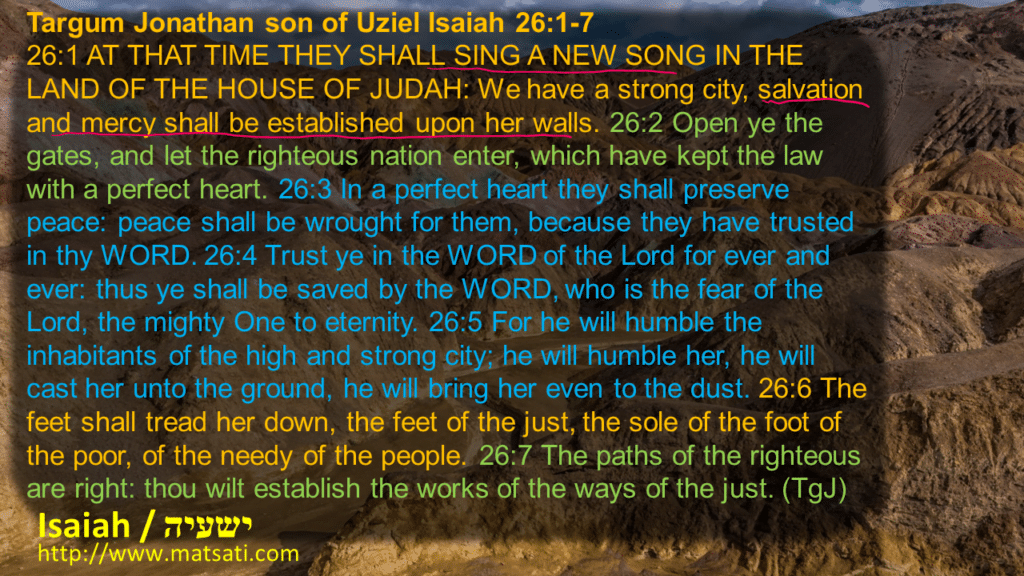
Targum Jonathan son of Uziel Isaiah 26:1-7
26:1 AT THAT TIME THEY SHALL SING A NEW SONG IN THE LAND OF THE HOUSE OF JUDAH: We have a strong city, salvation and mercy shall be established upon her walls. 26:2 Open ye the gates, and let the righteous nation enter, which have kept the law with a perfect heart. 26:3 In a perfect heart they shall preserve peace: peace shall be wrought for them, because they have trusted in thy WORD. 26:4 Trust ye in the WORD of the Lord for ever and ever: thus ye shall be saved by the WORD, who is the fear of the Lord, the mighty One to eternity. 26:5 For he will humble the inhabitants of the high and strong city; he will humble her, he will cast her unto the ground, he will bring her even to the dust. 26:6 The feet shall tread her down, the feet of the just, the sole of the foot of the poor, of the needy of the people. 26:7 The paths of the righteous are right: thou wilt establish the works of the ways of the just. (TgJ)
Here the TgJ translates Isaiah saying, א בְעִדָנָא הַהוּא יְשַבְחוּן תוּשבְחָא חְדַתָא בְאַרעָא דְבֵית יְהוּדָה קִריַת תוּקפָא לַנָא פוּרקָן יִתְסָם עַל שוּרַהָא וְרַחְמִין׃ 26:1 AT THAT TIME THEY SHALL SING A NEW SONG IN THE LAND OF THE HOUSE OF JUDAH: We have a strong city, salvation and mercy shall be established upon her walls. (TgJ) This concept יְשַבְחוּן תוּשבְחָא חְדַתָא “sing a new song” is found in the Tanakh in the following locations:

There are three Psalms that start with precisely these words: Tehillim / Psalms 96, 98, and 149, each begin with שִׁ֣ירוּ לַ֭יהוָה שִׁ֣יר חָדָ֑שׁ “sing to the Lord a new song.” In addition to this, Isaiah 42:10 also writes the same saying, שִׁ֣ירוּ לַ֭יהוָה שִׁ֣יר חָדָ֑שׁ “sing to the Lord a new song.” Another Psalm also contains this phrase, Tehillim / Psalms 33:3 שִֽׁירוּ־לֹ֖ו שִׁ֣יר חָדָ֑שׁ הֵיטִ֥יבוּ נַ֝גֵּ֗ן בִּתְרוּעָֽה׃ “Sing unto him a new song; Play skilfully with a loud noise.” Tehillim / Psalm 144:9 אֱֽלֹהִ֗ים שִׁ֣יר חָ֭דָשׁ אָשִׁ֣ירָה לָּ֑ךְ בְּנֵ֥בֶל עָ֝שֹׂ֗ור אֲזַמְּרָה־לָּֽךְ׃ “I will sing a new song unto thee, O God: Upon a psaltery and an instrument of ten strings will I sing praises unto thee.” This idea of singing a new song is how the Psalmist declares the glory and praise of God due to His love, mercy, and salvation that only He can provide. We also find NT texts to this extent, such as in the book of Revelation. (See Revelation 5:9 and 14:3) Tehillim / Psalms 40 provides us some insights saying, ד וַיִּתֵּ֬ן בְּפִ֨י׀ שִׁ֥יר חָדָשׁ֮ תְּהִלָּ֪ה לֵֽאלֹ֫הֵ֥ינוּ יִרְא֣וּ רַבִּ֣ים וְיִירָ֑אוּ וְ֝יִבְטְח֗וּ בַּיהוָֽה׃ 40:3 And he hath put a new song in my mouth, even praise unto our God: Many shall see it, and fear, and shall trust in the LORD. (KJV) Here the Psalmist suggests it is the Lord who places this song in our hearts. To create a new song is to increase faith and to facilitate trusting in the Lord! The idea in these Psalms is related to being delivered by God, and the miracle of God’s mercy upon His people! This is how Isaiah speaks according to the TgJ, א בְעִדָנָא הַהוּא יְשַבְחוּן תוּשבְחָא חְדַתָא בְאַרעָא דְבֵית יְהוּדָה קִריַת תוּקפָא לַנָא פוּרקָן יִתְסָם עַל שוּרַהָא וְרַחְמִין׃ 26:1 AT THAT TIME THEY SHALL SING A NEW SONG IN THE LAND OF THE HOUSE OF JUDAH: We have a strong city, salvation and mercy shall be established upon her walls. (TgJ) Radak interprets this verse in the following way:
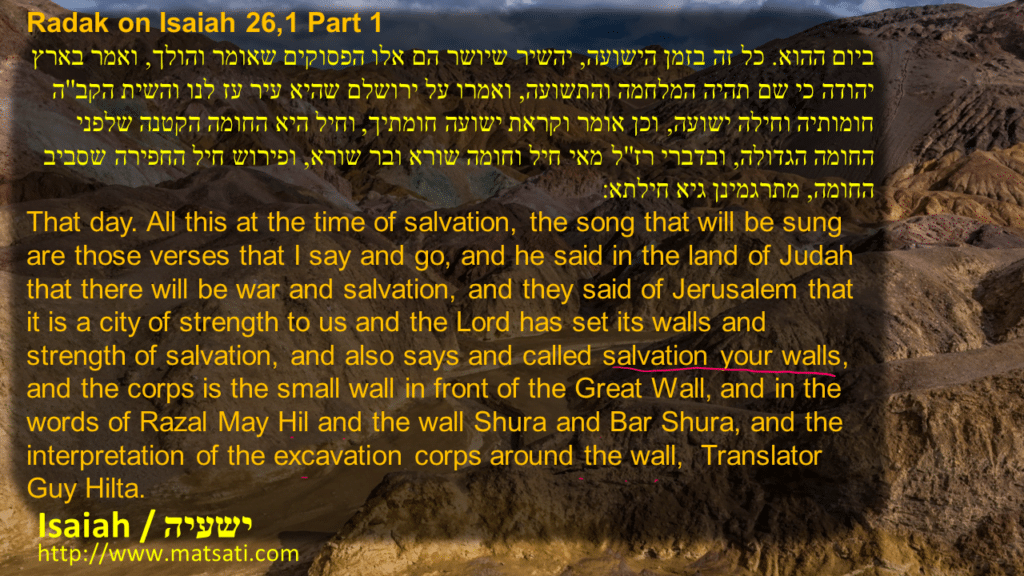
Radak on Isaiah 26,1 Part 1
ביום ההוא. כל זה בזמן הישועה, יהשיר שיושר הם אלו הפסוקים שאומר והולך, ואמר בארץ יהודה כי שם תהיה המלחמה והתשועה, ואמרו על ירושלם שהיא עיר עז לנו והשית הקב”ה חומותיה וחילה ישועה, וכן אומר וקראת ישועה חומתיך, וחיל היא החומה הקטנה שלפני החומה הגדולה, ובדברי רז”ל מאי חיל וחומה שורא ובר שורא, ופירוש חיל החפירה שסביב החומה, מתרגמינן גיא חילתא:
That day. All this at the time of salvation, the song that will be sung are those verses that I say and go, and he said in the land of Judah that there will be war and salvation, and they said of Jerusalem that it is a city of strength to us and the Lord has set its walls and strength of salvation, and also says and called salvation your walls, and the corps is the small wall in front of the Great Wall, and in the words of Razal May Hil and the wall Shura and Bar Shura, and the interpretation of the excavation corps around the wall, Translator Guy Hilta.
Radak says והשית הקב”ה חומותיה וחילה ישועה “and the Lord has set its walls and strength of salvation” where the Lord Himself is that strength and that wall who protects. And וכן אומר וקראת ישועה חומתיך “and also says and called salvation your walls” Radak directs us to make note of the protection that God provides us in His salvation! In addition, the salvation that God provides is connected to faith and faithfulness. This is why the TgJ translates saying, ב פְתַחוּ תַרעַיָא וְיֵיעֹול עַמָא זַכָאָה דִנטַרוּ אֹורָיתָא בִלבַב שְלִים׃ 26:2 “Open ye the gates, and let the righteous nation enter, which have kept the law with a perfect heart.” (TgJ) based upon the MSS “Open ye the gates, that the righteous nation which keepeth the truth may enter in.” (פִּתְחוּ שְׁעָרִים וְיָבֹא גוֹי-צַדִּיק שֹׁמֵר אֱמֻנִים) The righteous are those who obey the word of God, this is the definition for righteousness. According to the DSS 4Q372 Fragments 1-2, the author writes that he will rise up to do righteousness and justice to tell of God’s loving kindness (Chesed / grace) and praise, and that the rebellious are those who have abandoned the Lord (your Torah). The takeaway points from the DSS are those who abandon God’s Torah are the rebellious ones. These DSS passages speak to abandoning Torah as being synonymous to abandoning God! This is a serious charge that is very relevant for us today! Note that when we read the Scriptures, we see as in this verse and in others, that God requires obedience to His holy word. We note that the only portions of the Torah that have been set aside temporarily are those that are not possible to be kept without the Temple in Jerusalem. These deal with the Temple service or ceremonial aspects. In addition, there is no theocratic government in the land of Israel either. Yeshua himself said that the commands do not pass away, and Paul paid for sacrifices according to the book of Acts. The interesting aspect of the Karbanot for the vow of the nazarite is this includes the olah (whole burnt offering), the khatat (sin offering), the asham (guilt offering), and the Mincha. The point was these earthly sacrifices were not a substitute for what Yeshua did, and neither was what Yeshua did a substitute for what was on earth. We remember how Hebrews 8:1-8 states that Yeshua was not a priest here on earth. His priesthood was in heaven, and His sacrifice and atonement were made upon the heavenly altar. This is how and why what he did on our behalf differed slightly from the Torah command, all of which were types and shadows of what He was about to do on our behalf. For example, His bearing our sins and making atonement, is paralleled in the priesthood bearing the sin of the individual and making atonement before God. Note also the Cohen Hagadol (high priest) also once a year made atonement for the entire nation of the faithful. We note what Yeshua said according to the Greek text in the NT.
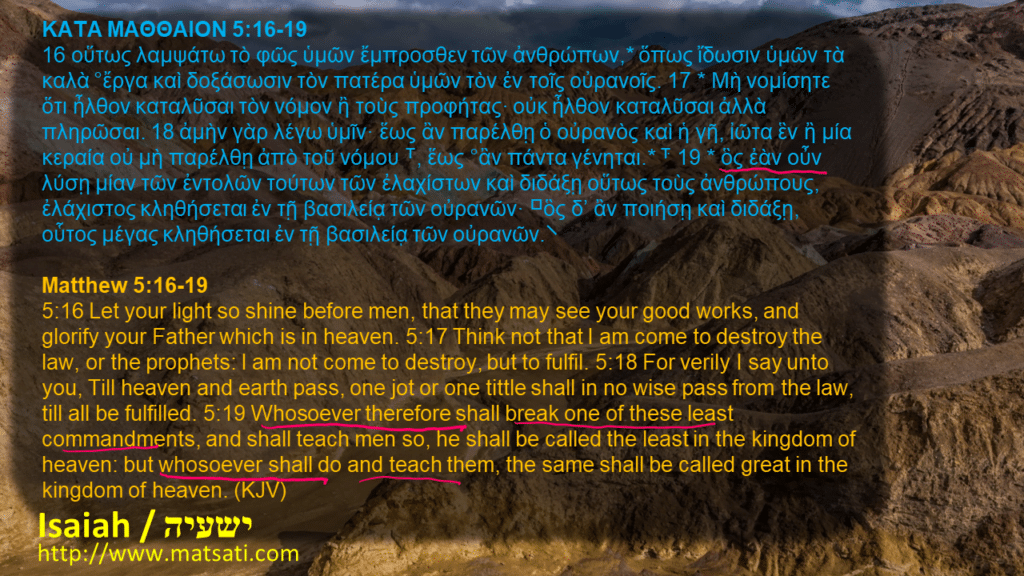
ΚΑΤΑ ΜΑΘΘΑΙΟΝ 5:16-19
16 οὕτως λαμψάτω τὸ φῶς ὑμῶν ἔμπροσθεν τῶν ἀνθρώπων,* ὅπως ἴδωσιν ὑμῶν τὰ καλὰ °ἔργα καὶ δοξάσωσιν τὸν πατέρα ὑμῶν τὸν ἐν τοῖς οὐρανοῖς. 17 * Μὴ νομίσητε ὅτι ἦλθον καταλῦσαι τὸν νόμον ἢ τοὺς προφήτας· οὐκ ἦλθον καταλῦσαι ἀλλὰ πληρῶσαι. 18 ἀμὴν γὰρ λέγω ὑμῖν· ἕως ἂν παρέλθῃ ὁ οὐρανὸς καὶ ἡ γῆ, ἰῶτα ἓν ἢ μία κεραία οὐ μὴ παρέλθῃ ἀπὸ τοῦ νόμου ⸆, ἕως °ἂν πάντα γένηται.* ⸇ 19 * ὃς ἐὰν οὖν λύσῃ μίαν τῶν ἐντολῶν τούτων τῶν ἐλαχίστων καὶ διδάξῃ οὕτως τοὺς ἀνθρώπους, ἐλάχιστος κληθήσεται ἐν τῇ βασιλείᾳ τῶν οὐρανῶν· ⸋ὃς δʼ ἂν ποιήσῃ καὶ διδάξῃ, οὗτος μέγας κληθήσεται ἐν τῇ βασιλείᾳ τῶν οὐρανῶν.⸌
Matthew 5:16-19
5:16 Let your light so shine before men, that they may see your good works, and glorify your Father which is in heaven. 5:17 Think not that I am come to destroy the law, or the prophets: I am not come to destroy, but to fulfil. 5:18 For verily I say unto you, Till heaven and earth pass, one jot or one tittle shall in no wise pass from the law, till all be fulfilled. 5:19 Whosoever therefore shall break one of these least commandments, and shall teach men so, he shall be called the least in the kingdom of heaven: but whosoever shall do and teach them, the same shall be called great in the kingdom of heaven. (KJV)
The key phrase is from Matthew 5:19 which states ὃς ἐὰν οὖν “whosoever therefore.” We note that Yeshua is saying “whosoever disobeys…” and “whosoever obeys…” This is key because the whosoever is a reference to “anyone” either Jew or non-Jew. This provides context for continuity in the biblical interpretation, that takes us back to the Torah and Isaiah regarding the salvation of God that functions in faith and faithfulness to God. We note that these things reveal to us that Yeshua and the disciples were not saying they wanted the non-Jew to be the least in the kingdom telling them they are now free from the commands of God. This is obviously an erroneous idea! Simple logic dictates this! We also note the rabbis also agree with this logical conclusion, based on their interpretation according to Sifra Acharei Mot, Chapter 13:12.
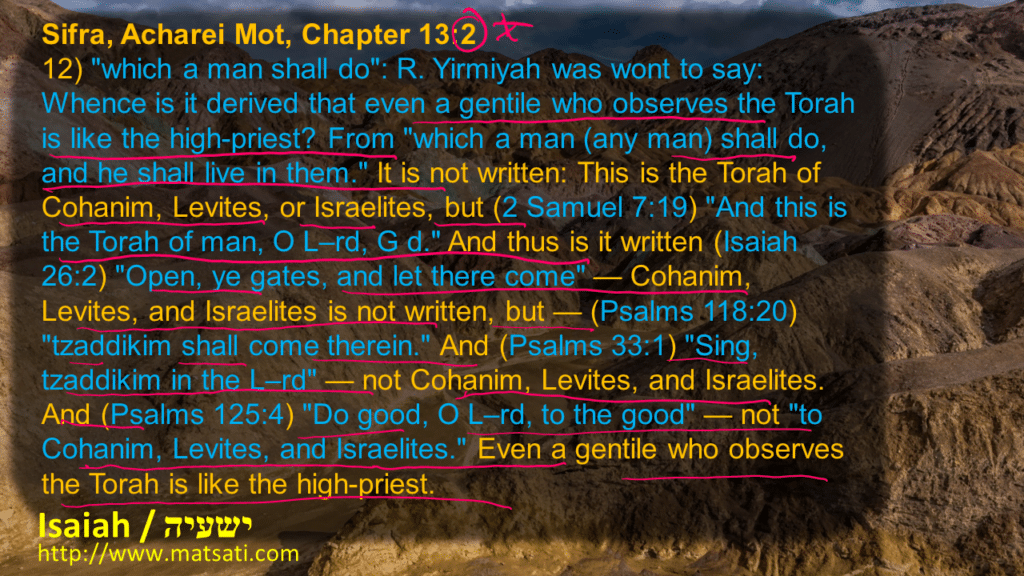
Sifra, Acharei Mot, Chapter 13:2
12) “which a man shall do”: R. Yirmiyah was wont to say: Whence is it derived that even a gentile who observes the Torah is like the high-priest? From “which a man (any man) shall do, and he shall live in them.” It is not written: This is the Torah of Cohanim, Levites, or Israelites,” but (2 Samuel 7:19) “And this is the Torah of man, O L–rd, G d.” And thus is it written (Isaiah 26:2) “Open, ye gates, and let there come” — Cohanim, Levites, and Israelites is not written, but — (Psalms 118:20) “tzaddikim shall come therein.” And (Psalms 33:1) “Sing, tzaddikim in the L–rd” — not Cohanim, Levites, and Israelites. And (Psalms 125:4) “Do good, O L–rd, to the good” — not “to Cohanim, Levites, and Israelites.” Even a gentile who observes the Torah is like the high-priest.
Here the rabbis describe the Gentile who obeys God’s Word, the Torah is like the Cohen Hagadol (High Priest). This is a very interesting interpretation, since the Torah mandates that only Levites can be priests. The point the rabbis are making is that these statements are generalizations, they are not specific to a people, or to a tribe or priest (cohen). The gates of salvation are open to all who would humble themselves and seek the God in heaven, the God of Israel and His Messiah Yeshua! The rabbinic opinion continues according to the commentary Shemirat HaLashon:
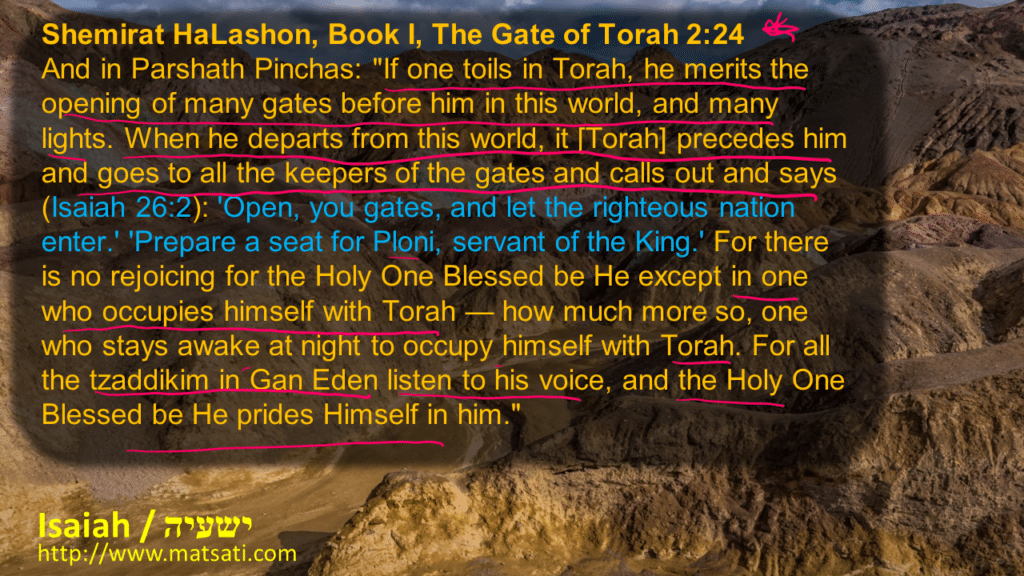
Shemirat HaLashon, Book I, The Gate of Torah 2:24
And in Parshath Pinchas: “If one toils in Torah, he merits the opening of many gates before him in this world, and many lights. When he departs from this world, it [Torah] precedes him and goes to all the keepers of the gates and calls out and says (Isaiah 26:2): ‘Open, you gates, and let the righteous nation enter.’ ‘Prepare a seat for Ploni, servant of the King.’ For there is no rejoicing for the Holy One Blessed be He except in one who occupies himself with Torah — how much more so, one who stays awake at night to occupy himself with Torah. For all the tzaddikim in Gan Eden listen to his voice, and the Holy One Blessed be He prides Himself in him.”
Here the rabbis continue with a discussion on toiling in the Torah. What does it mean to toil in the Torah? To toil alludes to “‘walking,’ a physically demanding act” which is connected to the Torah, or the study of the Torah. In parashat Bekhukotai the opening verse states the following, ג אִם-בְּחֻקֹּתַי תֵּלֵכוּ וְאֶת-מִצְוֹתַי תִּשְׁמְרוּ וַעֲשִֹיתֶם אֹתָם: 26:3 If ye walk in my statutes, and keep my commandments, and do them; (KJV, Vauikra / Leviticus 26:3) and the opening words states אִם-בְּחֻקֹּתַי תֵּלֵכוּ “if in my statutes you walk” we note that this does not translate “if you keep my mitzvot” but says “if you will go in my statutes” and this is a significant observation. It pertains to applying God’s word to our lives. Rashi cites Sifra which states this means “that you should toil in Torah [study].” Again, the word בְּחֻקֹּתַי comes from the word חוק meaning “statute” and the uniqueness of the statute is that we do not necessarily know the reason for the command. It is simply a decree from God that we are to obey and incorporate into our lives. These are given and the only reason is we do it just because God wants us to, and for no other reason, because of our love for Him. The Chazal states that בְּחֻקֹּתַי תֵּלֵכוּ is the act of accepting the yoke of heaven and how תֵּלֵכוּ refers to the service to God by the way that we live our lives, there is no reward for doing what we should be doing. They say that each of us has been imbued with greater potential for emunah (belief/faith). The rabbinic opinion is that one does not need emunah for what one already knows. One needs emunah to walk in godliness and that emunah causes us to strive to walk in greater and greater levels of godliness for the sake of God in heaven. This is the meaning of Shemirat HaLashon commenting on the merits of Torah study as opening to man gates in this world, and the one who studies God’s Word is one who listens to the voice of God. Mekhilta d’Rabbi Yishmael writes the following concerning these things:
Mekhilta d’Rabbi Yishmael 15:1 Part 1
אז ישיר משה ובני ישראל, ר’ נחמיה אומר כל המקבל עליו מצוה אחת באמנה כדאי הוא שתשרה עליו רוח הקדש שכן מצינו באבותינו שבשכר אמנה שהאמינו אבותינו בה’ זכו ושרתה עליהם רוח הקדש ואמרו שירה שנא’ ויאמינו בה’ ובמשה עבדו ונאמר אז ישיר משה ובני ישראל. וכן את מוצא שלא ירש אברהם אבינו העולם הזה והעולם הבא אלא בזכות אמנה שהאמין בה’ שנ’ והאמין בה’ ויחשבה לו צדקה. וכן את מוצא שלא נגאלו ישראל ממצרים אלא בשכר האמנה שנ’ ויאמן העם (שמות ד) וכה”א אמונים נוצר ה’ (תהלים לא) מזכירין אמונת אבות ואו’ ואהרן וחור תמכו בידיו וגו’ ואומר זה השער לה’ צדיקים יבאו בו (שם קיח) בבעלי אמנה מהו אומר פתחו שערים ויבא גוי צדיק שומר אמונים (ישעיה כו) השער הזה כל בעלי אמונה נכנסין בו וכה”א טוב להודות לה’ ולזמר לשמך עליון להגיד בבקר חסדך ואמונתך בלילות עלי עשור ועלי נבל עלי הגיון בכנור כי שמחתני ה’ בפעליך במעשה ידיך ארנן (תהלים צב) מי גרם לנו לבא לידי שמחה זו שכר אמנה שהאמינו אבותינו בעולם הזה שכלו לילה [לפיכך זכינו לעולם הבא שכולו בקר] לכך נאמר להגיד בבקר חסדך ואמונתך בלילות. וכן יהושפט אומר לעם האמינו בה’ אלהיכם ותאמנו האמינו בנביאיו והצליחו (דה”ב כ) וכתיב עיניך הלא לאמונה (ירמיה ה) וכתיב וצדיק באמונתו יחיה (חבקוק ב) וכתיב חדשים לבקרים רבה אמונתך (איכה ג). וכן אתה מוצא שאין הנליות /הגלויות/ מתכנסות אלא בשכר אמנה שנ’ אתי מלבנון כלה אתי מלבנון תבואי תשורי מראש וגו’ (שה”ש ד) וכתיב וארשתיך לי לעולם וארשתיך לי באמונה (הושע ב). הא גדולה אמנה לפני הקב”ה שבשכר אמונה שרתה עליהם רוח הקדש ואמרו שירה שנ’ ויאמינו בה’ ובמשה עבדו אז ישיר משה ובני ישראל את השירה הזאת לה’ וכן הוא אומר ויאמינו בדבריו ישירו תהלתו (תהילים ק״ו:י״ב) R. Nechemiah says: If one takes upon himself a single mitzvah in (true) faith, he is worthy of having the Holy Spirit repose upon him. And thus do we find with Moses, David, and Devorah that (in the fulness of their faith) they chanted song and the Holy Spirit reposed upon them. And thus do you find that Israel were redeemed from Egypt only in reward for their faith, viz. (Exodus 4:31) “And the people believed, etc.” And thus is it written (Psalms 31:24) “The L rd guards the faithful.” The faithfulness of the fathers is brought to remembrance, viz. (Exodus 17:12) “And Aaron and Chur supported his (Moses’) hands, and his hands were (lifted in) faithfulness until the sun set.” And it is written (Psalms 108:20) “This is the gate to the L rd. Tzaddikim (faithful in prayer) will enter through it.” What is written of the “believers”? (Isaiah 26:2) “Open the gates and let there enter a nation that is (a) tzaddik, a keeper of faith” — this gate is to be entered by all believers. (Psalms 92:2-5) “It is good to praise the L rd and so sing to Your exalted name. To proclaim in the morning Your lovingkindness, and Your faithfulness in the nights. With a ten-stringed harp, with voice and lyre together. For You have gladdened me by Your deeds, O L rd. At the work of Your hands I will sing.” What made him worthy of this joy? The belief held by our fathers in this world, which is all “night.” Thus, “to proclaim in the world (to come) Your lovingkindness and Your faithfulness in the ‘nights'” (i.e., this world). And thus with Yehoshafat (II Chronicles 20:20) “And they rose early in the morning and they went to the desert of Tekoa. And as they went forth Yehoshafat arose and said: ‘Hear me, Judah and dwellers of Jerusalem: Believe in the L rd your G d and you will rest assured. Believe in His prophets and you will succeed.'” And it is written (Jeremiah 5:3) “O L rd, are Your eyes not (looking) for belief?” (Habakkuk 2:4) “And the tzaddik in his belief shall live”, and (Eichah 3:23) “They (Your mercies) are renewed every morning — Great is Your faithfulness.” And thus do you find that the exiles are gathered in, only in reward for faith, as it is written (Song of Songs 4:8) “With Me, from Levanon, My bride; With Me from Levanon shall you come (out of exile). You shall look (upon the redemption) merosh amanah” (homiletically: “in the merit of emunah [belief]). (Hoshea 2:22) “And I will betroth you to Me forever … and I will betroth you to Me with emunah.”
Here rabbi Nechemiah says that when one takes a single mitzvah (command) in true faith, he is worthy of having the Holy spirit of God fall upon him. The biblical example provided is from Moshe, David, and Devorah being inspired by the Holy Spirit of God to sing a song. We note the significance of studying God’s word is connected to emunah (faith) and faithfulness, which lead to the indwelling of the Holy Spirit, and the Lord God saying that He will betroth us forever, and He will do so with emunah (faith). All of these concepts are consistent with the NT narrative, and with what we read according to The TgJ on Isaiah of the joy of the Lord, the singing in song can only come when one remains in the Lord, and remains faithful to Him and His Word.
Isaiah continues according to the TgJ to say, ג בִלבַב שְלִים נְטַרוּ שְלָמָא שְלָמָא יִתעְבֵיד לְהֹון אְרֵי בְמֵימְרָך אִתרְחִיצוּ׃ 26:3 In a perfect heart they shall preserve peace: peace shall be wrought for them, because they have trusted in thy WORD. ד אִתרְחִיצוּ עַל מֵימְרָא דַיוי לְעָלְמָא וּלעָלְמֵי עָלְמַיָא אְרֵי בְכֵין תִתפַרקוּן בְמֵימַר דְחִילָא יוי תְקֹוף עָלְמַיָא׃ 26:4 Trust ye in the WORD of the Lord for ever and ever: thus ye shall be saved by the WORD, who is the fear of the Lord, the mighty One to eternity. ה אְרֵי אַמאֵיך יָתְבֵי רוּמָא קִריָא תַקִיפָא יִמאְכִינַה יִרמֵינַה עַד אַרעָא יִמטֵינַה עַד עַפרָא׃ 26:5 For he will humble the inhabitants of the high and strong city; he will humble her, he will cast her unto the ground, he will bring her even to the dust. ו יְדוּשִינַה רַגלִין רַגלֵי צַדִיקַיָא פַרסַת עִנוְתָנַיָא חַשִיכֵי עַמָא׃ 26:6 The feet shall tread her down, the feet of the just, the sole of the foot of the poor, of the needy of the people. ז אֹורְחַת צָדִיקַיָא כֵיוָנָן אַף עוּבָדֵי אֹורְחַת צַדִיקַיָא תַתקֵין׃ 26:7 The paths of the righteous are right: thou wilt establish the works of the ways of the just. (TgJ) We note the rabbinic opinion on the power of God’s Word. God’s Word is powerful to save, to bring peace, to humble, and to tread down the proud, and raise up the poor and needy! The righteous will establish the words of righteousness in their lives. Rashi states the following concerning these verses:
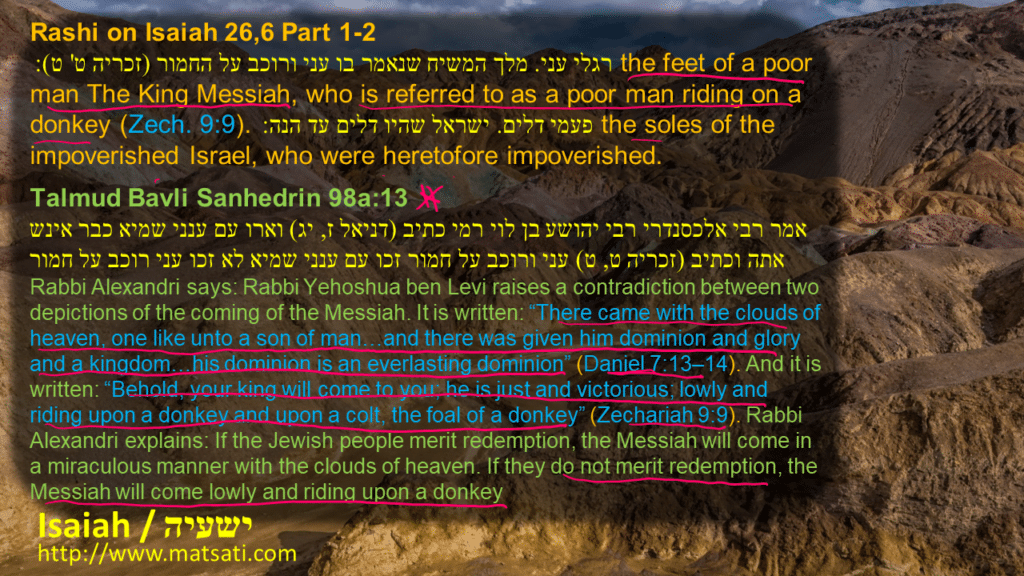
Rashi on Isaiah 26,6 Part 1-2
רגלי עני. מלך המשיח שנאמר בו עני ורוכב על החמור (זכריה ט’ ט): the feet of a poor man The King Messiah, who is referred to as a poor man riding on a donkey (Zech. 9:9).
פעמי דלים. ישראל שהיו דלים עד הנה: the soles of the impoverished Israel, who were heretofore impoverished.
Rashi interprets this humbling as being a reference to the King Messiah riding on a donkey into the holy city based upon Zecharaiah 9:9. It is interesting what the Talmud Bavli Sanhedrin 98a, also states the following concerning this idea of the King Messiah as a poor man riding on a donkey.
Talmud Bavli Sanhedrin 98a:13
אמר רבי אלכסנדרי רבי יהושע בן לוי רמי כתיב (דניאל ז, יג) וארו עם ענני שמיא כבר אינש אתה וכתיב (זכריה ט, ט) עני ורוכב על חמור זכו עם ענני שמיא לא זכו עני רוכב על חמור Rabbi Alexandri says: Rabbi Yehoshua ben Levi raises a contradiction between two depictions of the coming of the Messiah. It is written: “There came with the clouds of heaven, one like unto a son of man…and there was given him dominion and glory and a kingdom…his dominion is an everlasting dominion” (Daniel 7:13–14). And it is written: “Behold, your king will come to you; he is just and victorious; lowly and riding upon a donkey and upon a colt, the foal of a donkey” (Zechariah 9:9). Rabbi Alexandri explains: If the Jewish people merit redemption, the Messiah will come in a miraculous manner with the clouds of heaven. If they do not merit redemption, the Messiah will come lowly and riding upon a donkey.
Here the discussion proceeds from descriptions of the coming of Messiah, from Daniel 7:13-14 verses Zechariah 9:9. The point made is that if the people merited redemption the Messiah would come on the clouds, whereas if they do not merit redemption, the Messiah will come lowly and riding upon a donkey. We note this is the description of Yeshua riding the donkey according to Matthew 21:1-11 and Mark 11:1-3. This idea of riding lowly on a donkey, was the way in which the King Messiah identified with and made a connection with ordinary people. Rashi expands upon this concept of the people being counted worthy for the Messiah to come on the clouds.
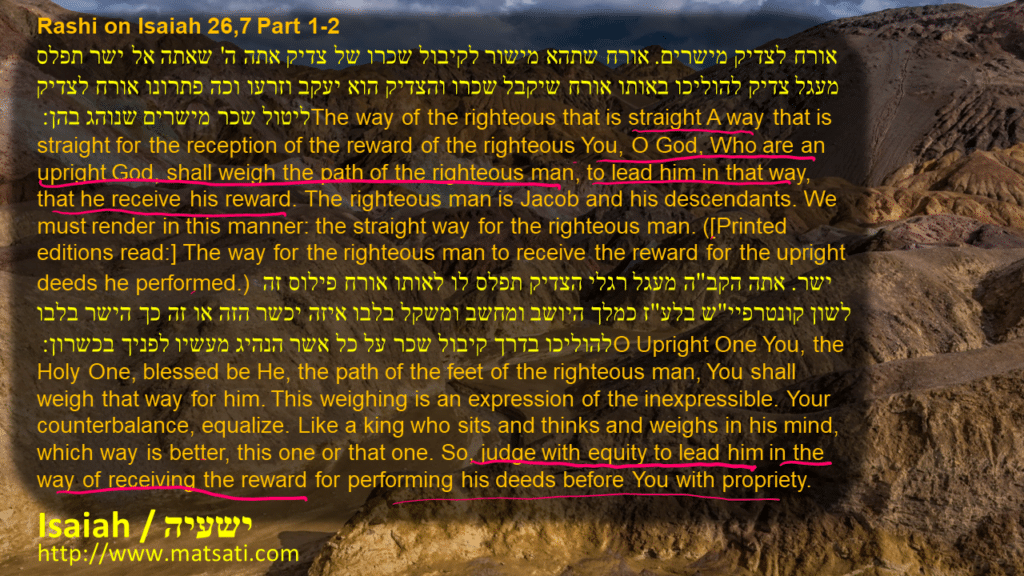
Rashi on Isaiah 26,7 Part 1-2
אורח לצדיק מישרים. אורח שתהא מישור לקיבול שכרו של צדיק אתה ה’ שאתה אל ישר תפלס מעגל צדיק להוליכו באותו אורח שיקבל שכרו והצדיק הוא יעקב וזרעו וכה פתרונו אורח לצדיק ליטול שכר מישרים שנוהג בהן: The way of the righteous that is straight A way that is straight for the reception of the reward of the righteous You, O God, Who are an upright God, shall weigh the path of the righteous man, to lead him in that way, that he receive his reward. The righteous man is Jacob and his descendants. We must render in this manner: the straight way for the righteous man. ([Printed editions read:] The way for the righteous man to receive the reward for the upright deeds he performed.) ישר. אתה הקב”ה מעגל רגלי הצדיק תפלס לו לאותו אורח פילוס זה לשון קונטרפיי”ש בלע”ז כמלך היושב ומחשב ומשקל בלבו איזה יכשר הזה או זה כך הישר בלבו להוליכו בדרך קיבול שכר על כל אשר הנהיג מעשיו לפניך בכשרון: O Upright One You, the Holy One, blessed be He, the path of the feet of the righteous man, You shall weigh that way for him. This weighing is an expression of the inexpressible. Your counterbalance, equalize. Like a king who sits and thinks and weighs in his mind, which way is better, this one or that one. So, judge with equity to lead him in the way of receiving the reward for performing his deeds before You with propriety.
The interesting point Rashi makes is “You, O God, Who are an upright God, shall weigh the path of the righteous man, to lead him in that way, that he receive his reward.” This again follows with our assessment that it is the Lord living and working in and through us that leads us to obedience to God’s holy Word. Rashi reiterates saying “So, judge with equity to lead him in the way of receiving the reward for performing his deeds before You with propriety.” Again, the rabbinic opinion is that it is the Lord who leads us in paths of righteousness. This is what we should be seeking, when we seek the Lord, we seek His help, His empowering through His Holy Spirit because of His mercy and grace. These things make God and His Messiah central to our lives, central as the source of our Kavanah (intentions), the source of our desire to live godly lives in purity and truth. It is the Lord who is working in us, this Torah centric principle of God dwelling in our midst! All things are for the glory of His holy name! Praise the Lord!
